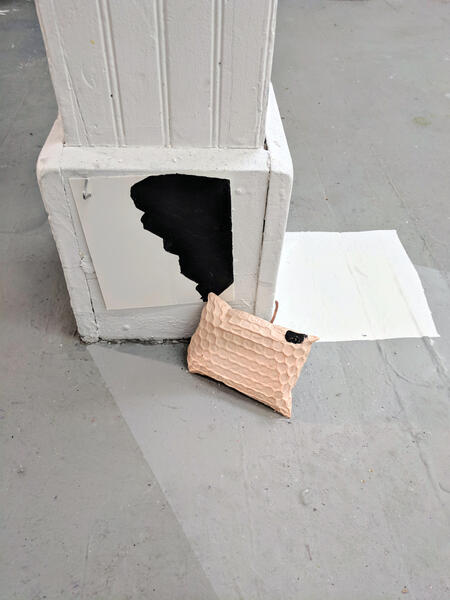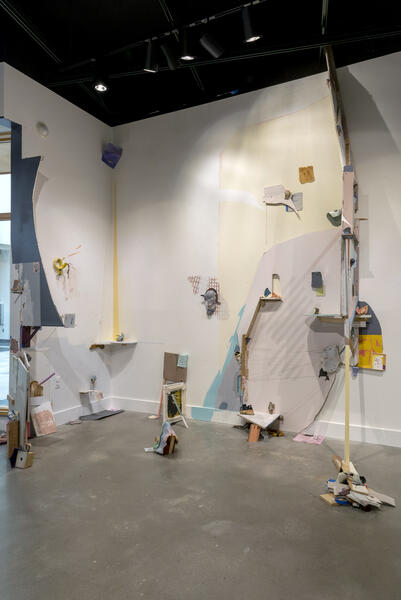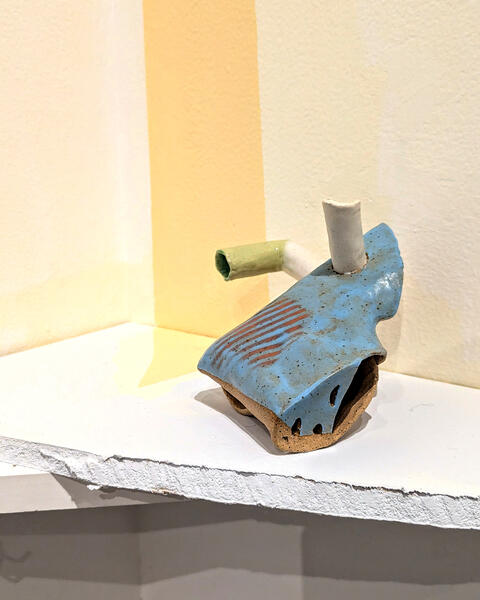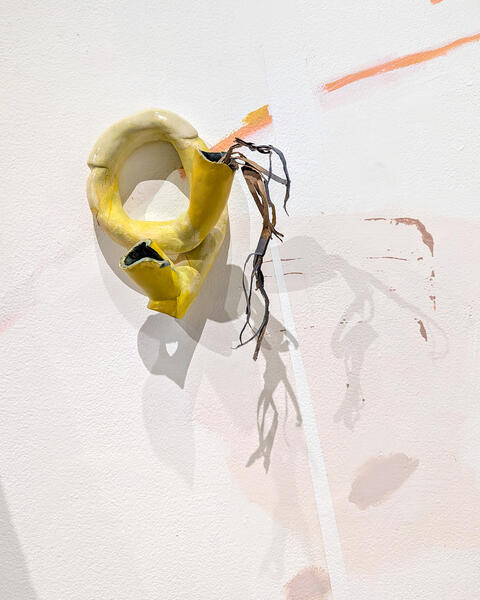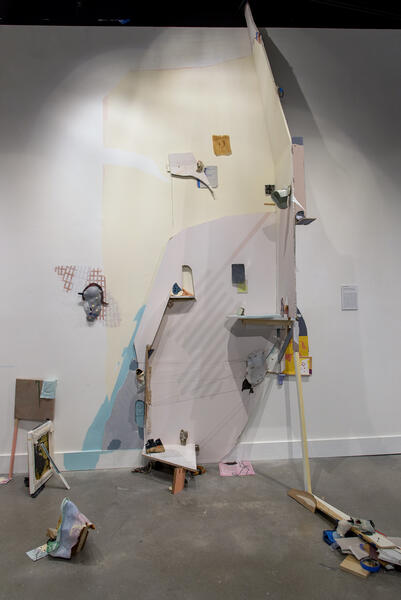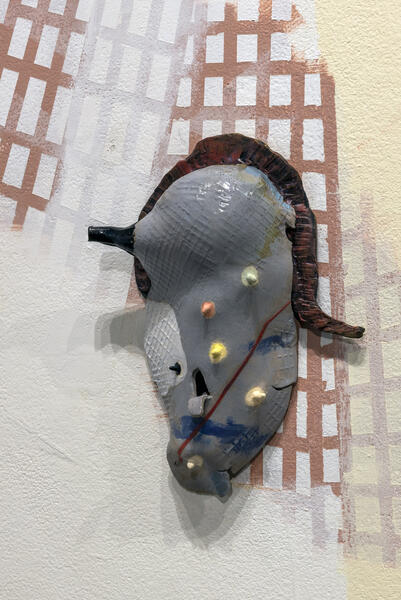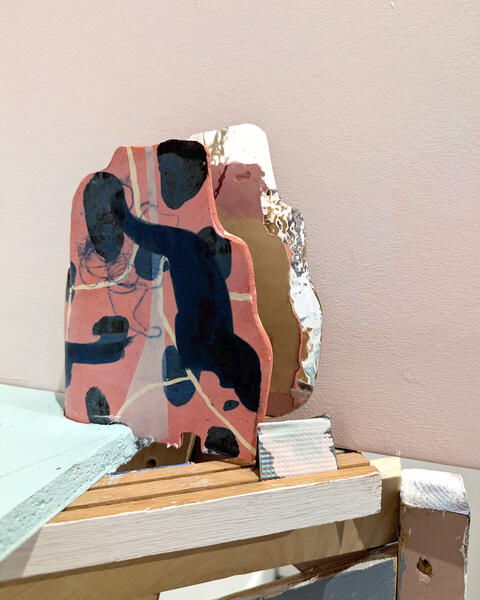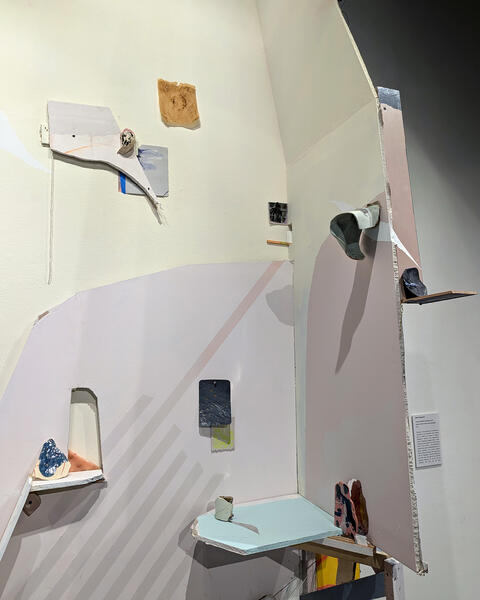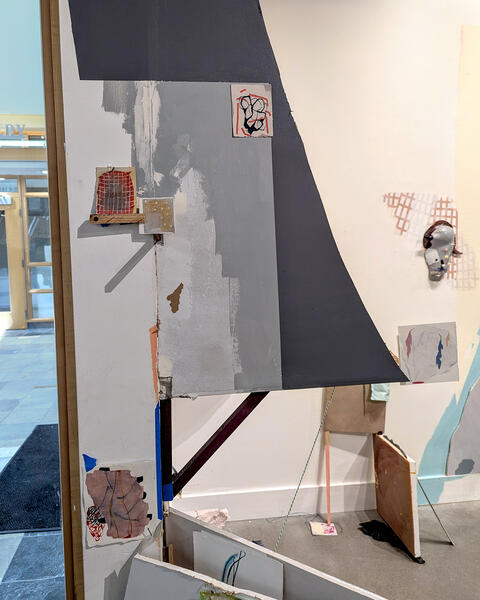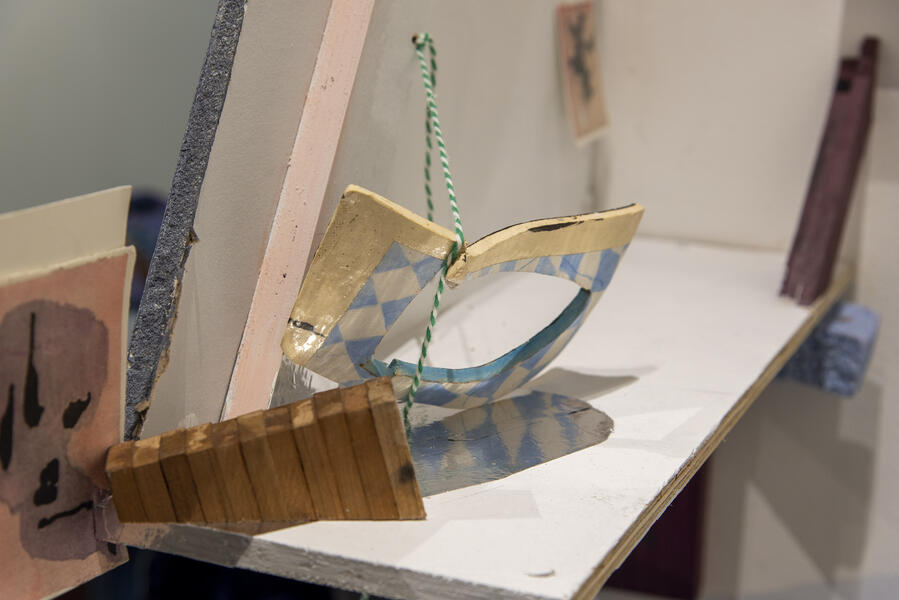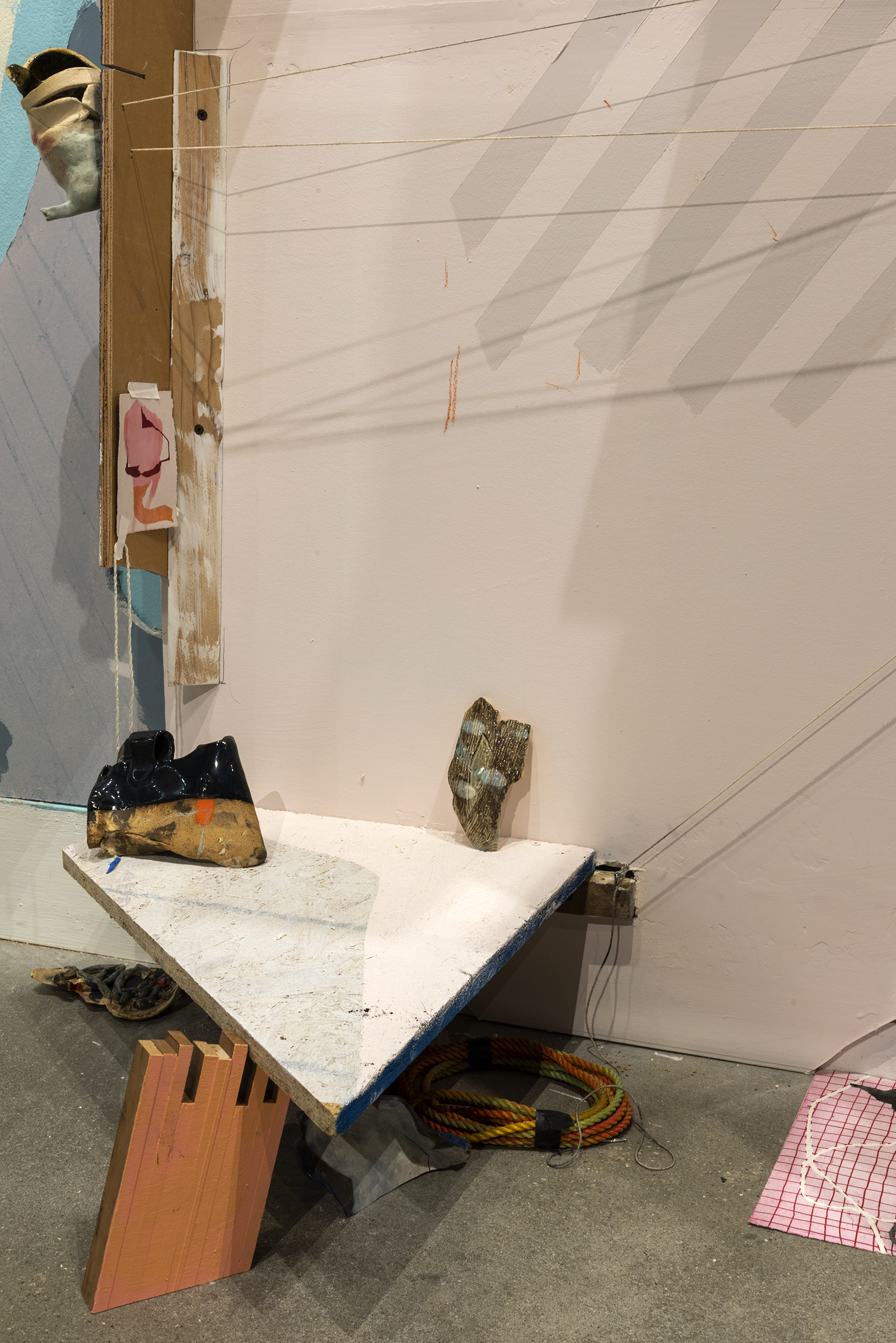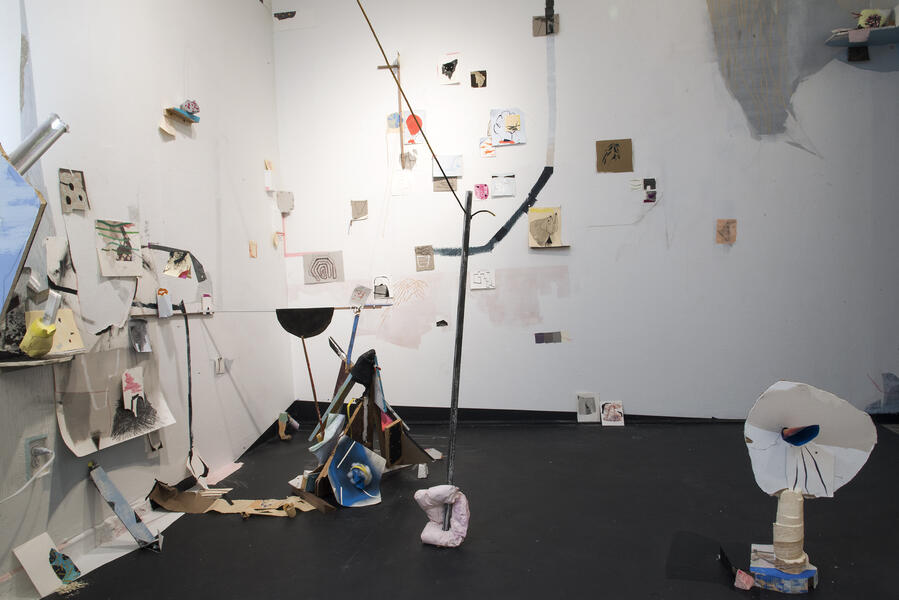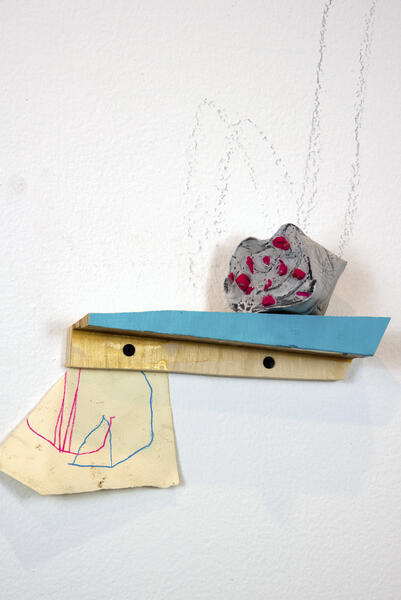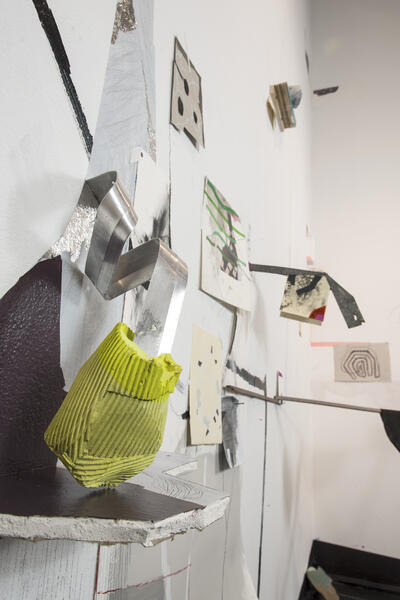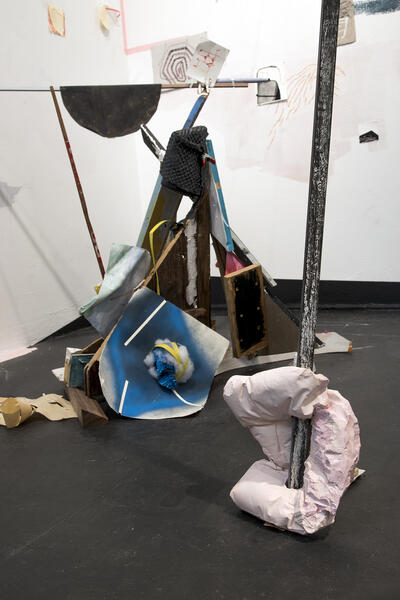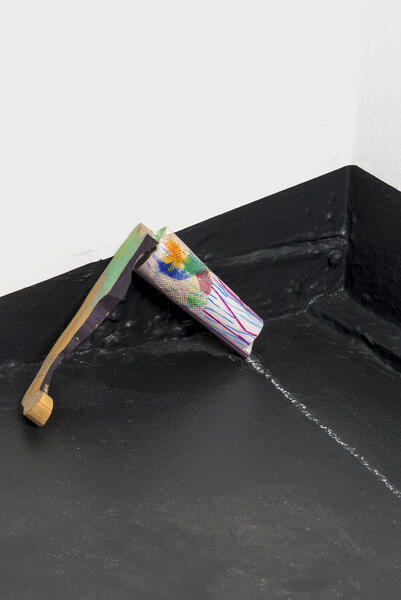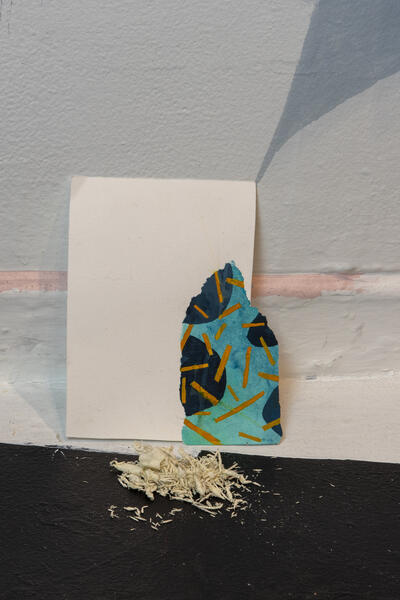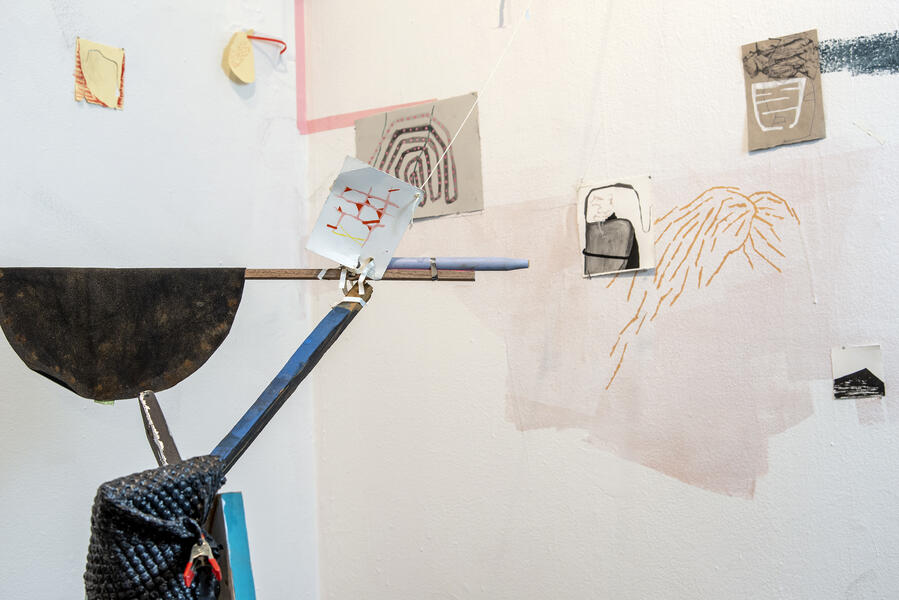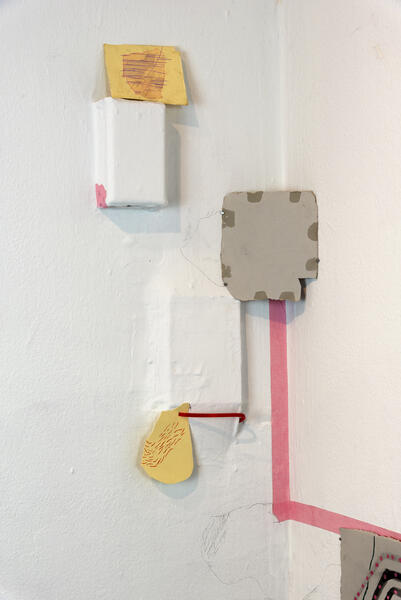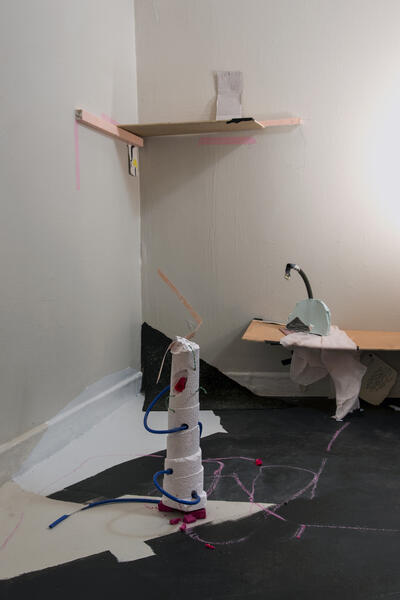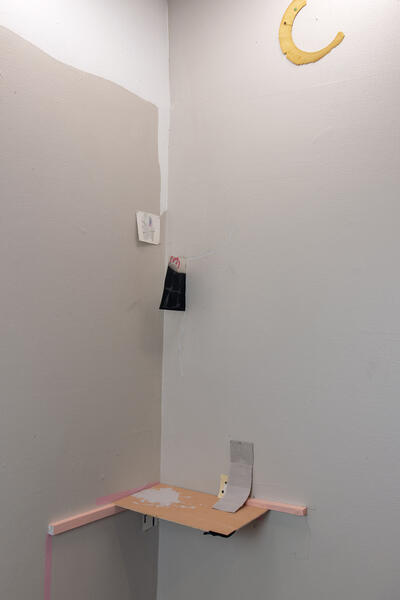Work samples
-
soft obstacle
Video walk-through of soft obstacle. Over the two-month run of the exhibition, I revisited the gallery on a weekly basis and made alterations to the piece—introducing new material, moving and excising existing elements—treating the room as a living, volatile ecosystem. This video records the final iteration of soft obstacle as it existed immediately before deinstallation.
About Ben
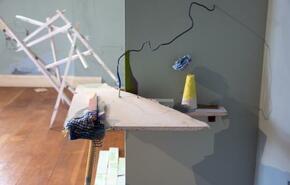
Ben Piwowar is a Baltimore-based artist whose practice combines painting, drawing, and site-resposive installation. His work uses abstraction and material play to reflect on fragility, adaptation, and regeneration.
He received an MFA in studio art from the University of Connecticut in 2011 and holds undergraduate degrees in painting and literature from the University of Maryland. Notable exhibitions include solo shows at School 33 Art Center in Baltimore and VisArts in Rockville (MD… more
I never said that I was brave (2024)
Drawing, hand-built ceramics, paint, drywall, lumber, gifts, trash
Improvised site-responsive installation created for the Awaken exhibition at Towson University, summer 2024.
Recent Paintings
A selection from a sequence paintings completed since 2023.
My paintings develop incrementally and unpredictably. Usually the parts dictate the refinement of the whole, rather than the other way around.
Many (not all) of my recent paintings land on an impression of defacement, occlusion, or incomplete concealment. I think of how a smeared window simultaneously calls attention to its own surface while aggravating our desire to see what's on the other side.
-
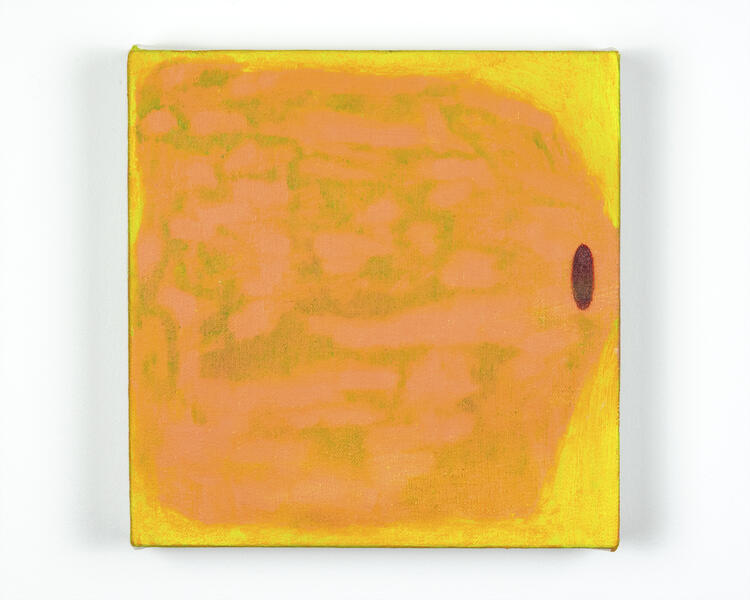 When all the numbers swim together
When all the numbers swim togetherOil on canvas over wood panel, 8 in x 8 in.
-
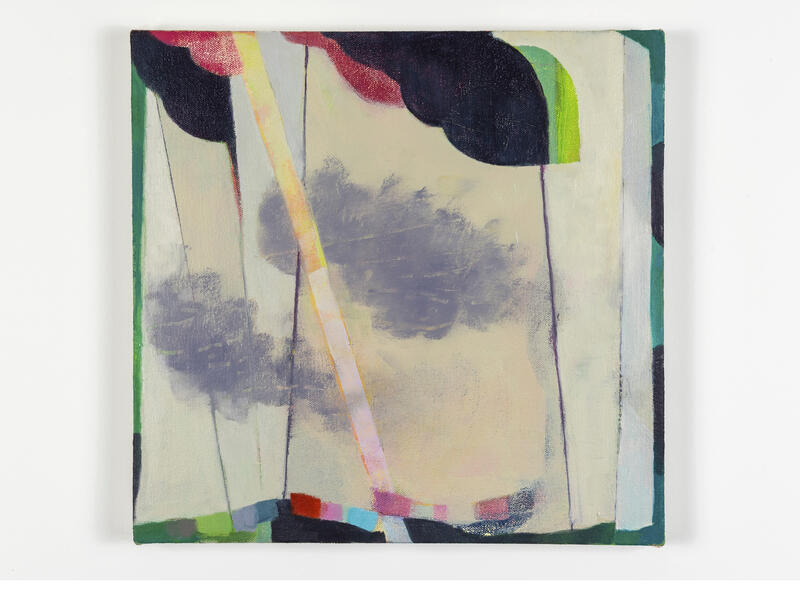 No Returning
No ReturningOil on canvas over wood panel, 12 in. x 12 in.
-
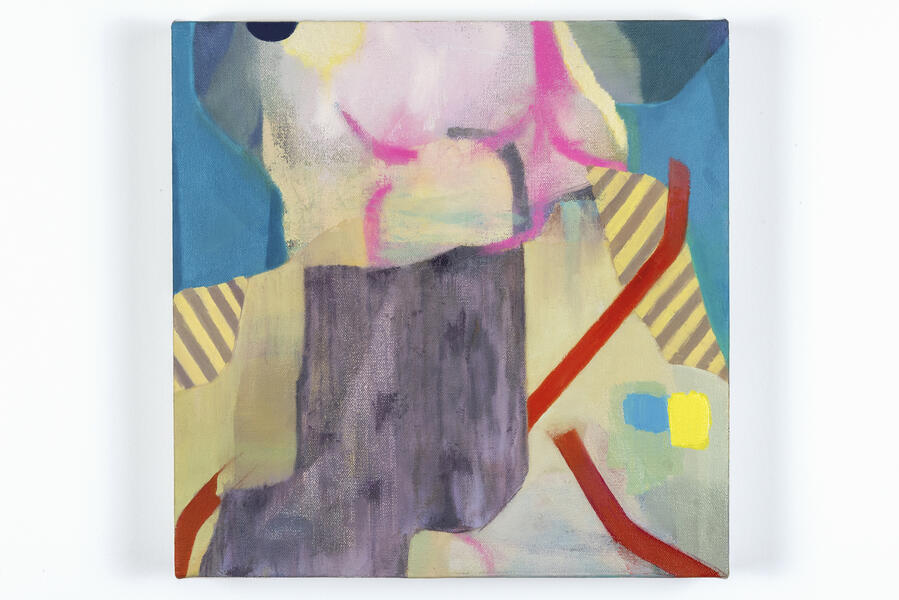 One Up
One UpOil on canvas over wood panel, 12 in. x 12 in.
-
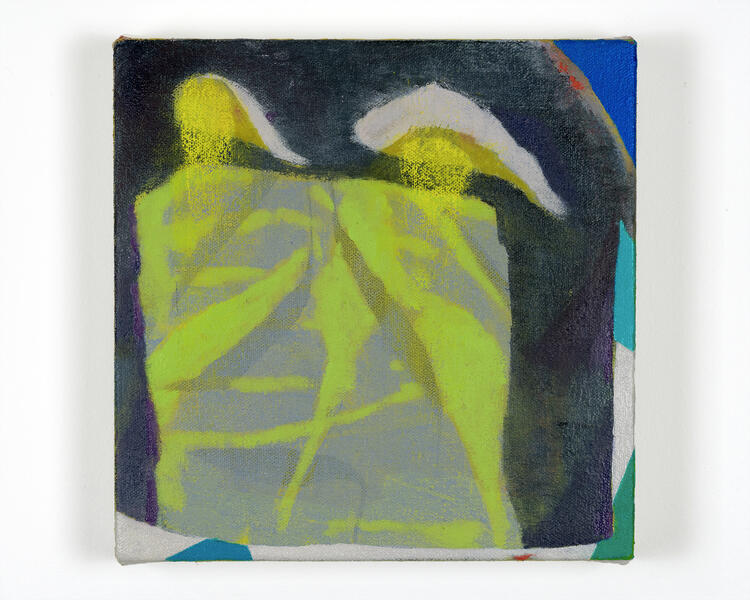 But if I were large and ruthless
But if I were large and ruthlessOil on canvas over wood panel, 8 in. x 8 in.
-
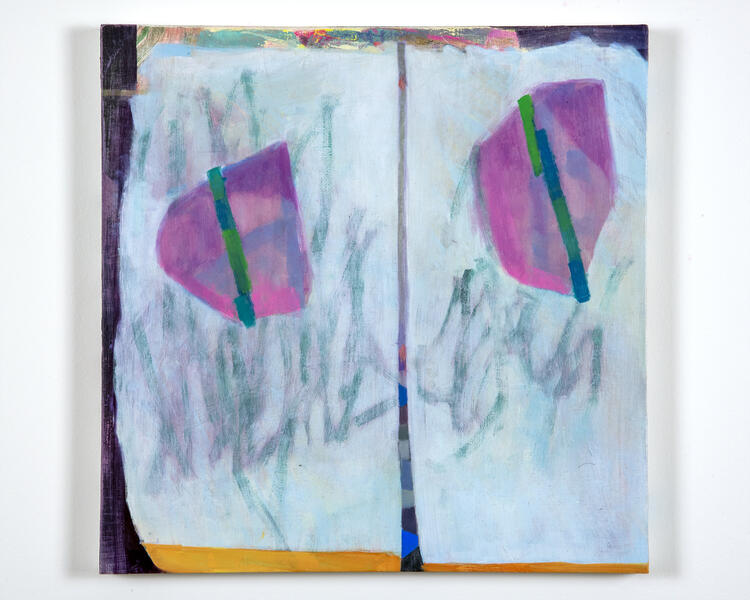 is it still there
is it still thereOil on wood panel, 12 in. x 12 in.
-
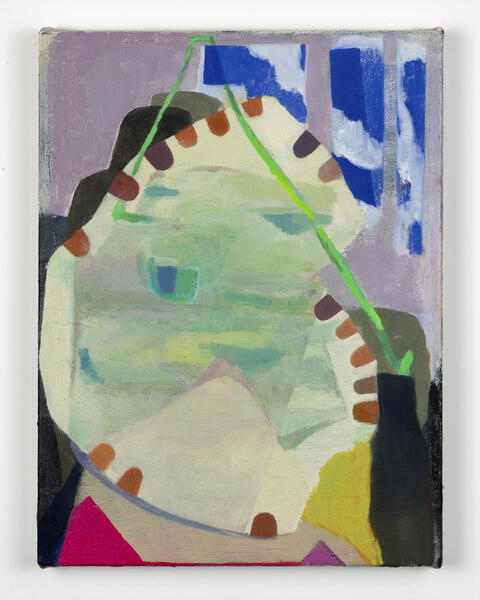 (not my) handsome mind
(not my) handsome mindOil on canvas over wood panel, 12 in. x 9 in.
-
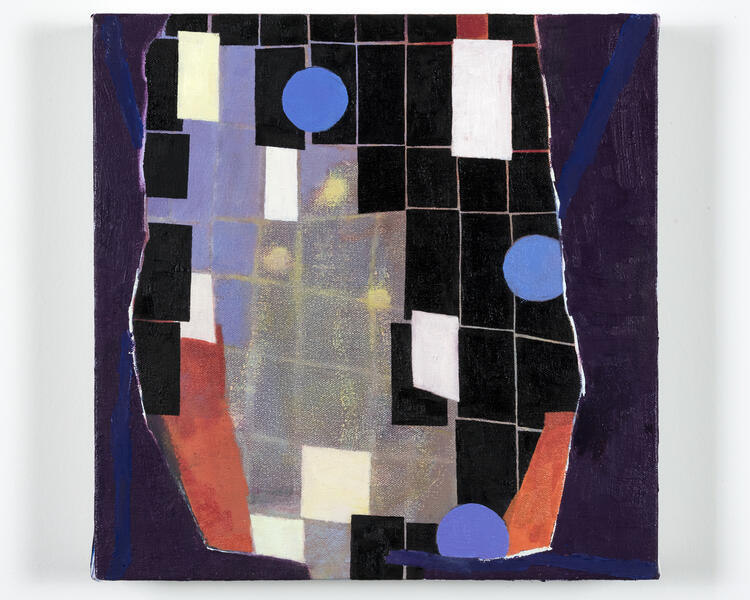 Developer
DeveloperOil on canvas over wood panel, 12 in. x 12 in
-
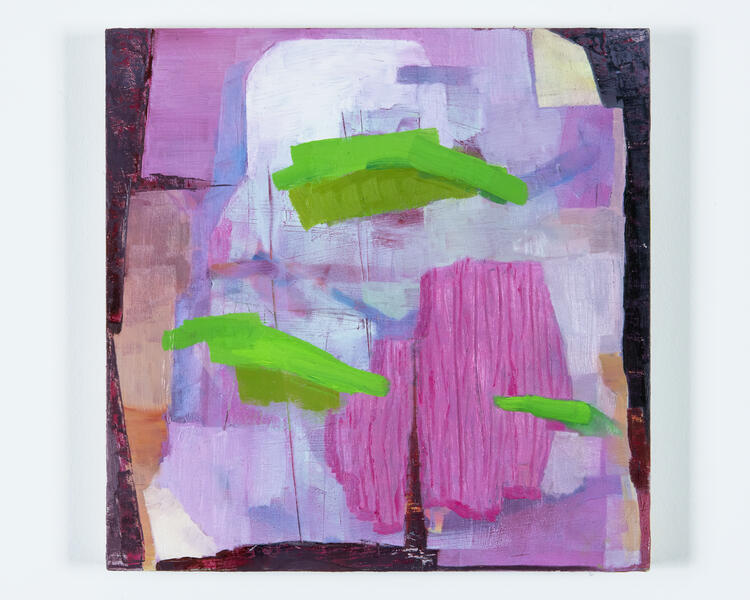 Scapegoat
ScapegoatOil on wood panel, 10 in. x 10 in.
soft obstacle (1/2)
soft obstacle
2019
Solo exhibition created for the School 33 Project Space Gallery in 2019. Over a decade of moving between painting and installation work, I had consistently generated a high volume of small, fragmentary works on paper; soft obstacle grew out of my wish to make a large piece that centered this body of work. While I retained much of my improvisational, site-responsive sculptural approach, the little drawings played an outsized role, like a population of trickster microbes influencing the form and trajectory of the gallery's ecosystem.
This exhibition realized another long-simmering desire, which was to create an installation that would change continuously over the course of the exhibition. Instead of presenting an arbitrarily "definitive" endpoint that would remain static for the two-month run of the show, I maintained an active space of perceptual fermentation, conflict, and evolution. The most intense period of making happened in the eight days leading up to the exhibition's opening. Afterwards, I revisited the space every week— quietly taking in everything that was happening, making alterations that felt organic to the existing dynamics of the room.
.
.
.
A few notes about how soft obstacle was made:
Materials
Per my usual methods, I set up to work in the gallery with no 'finished' objects and no definitive concept of how the installation would take shape. But I knew I wanted to key in on two strands of my studio practice: small works on paper (as mentioned above) most roughly four or five inches square, and cast objects. The latter was a very new experiment for me, where I was using discarded packing material and fabric as single-use molds for creating forms in pigmented plaster, with various foreign objects inserted into the plaster as it cured .
I also used salvaged lumber and drywall, either recycled from my previous installations or, in some cases, left behind by artists who had used the Project Space gallery before me.
Lighting
The gallery had no pre-installed track lighting, and I chose to use only the bulbs and fixtures available in gallery storage. This meant a menagerie of clamp lights, desk lamps, and LED tubes, all producing illumination of different temperature and intensity.
These lights were intentionally staged as conspicuous sculptural elements in direct correspondence with the things I brought from my studio; cords, plugs, clamps would be visible, and I would have to build structures as needed to control the placement and direction of illumination.
Process
I placed the lights before arranging any other materials. Then I began to populate the space with the drawings and plaster forms in response to the available light, augmenting the gallery architecture with platforms, half-walls, and other hastily-built protuberances. I looked for affinities and tensions between objects, playing with density versus sparseness, observing how different zones of the installation began to take on different characteristics, which suggested paths for refinement and subversion.
-
soft obstacle
Video walk-through of soft obstacle. Over the two-month run of the exhibition, I revisited the gallery on a weekly basis and made alterations to the piece—introducing new material, moving and excising existing elements—treating the room as a living, volatile ecosystem. This video records the final iteration of soft obstacle as it existed immediately before deinstallation.
-
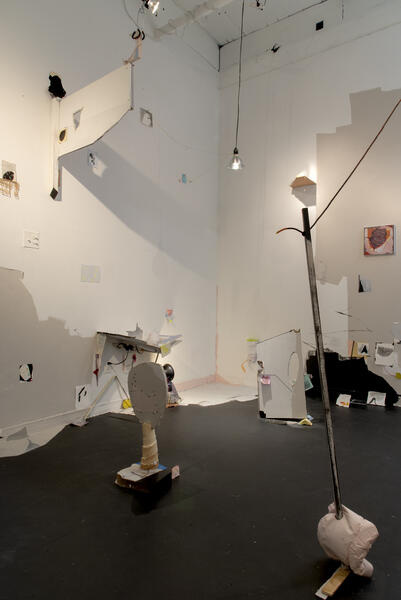 soft obstacle
soft obstacle -
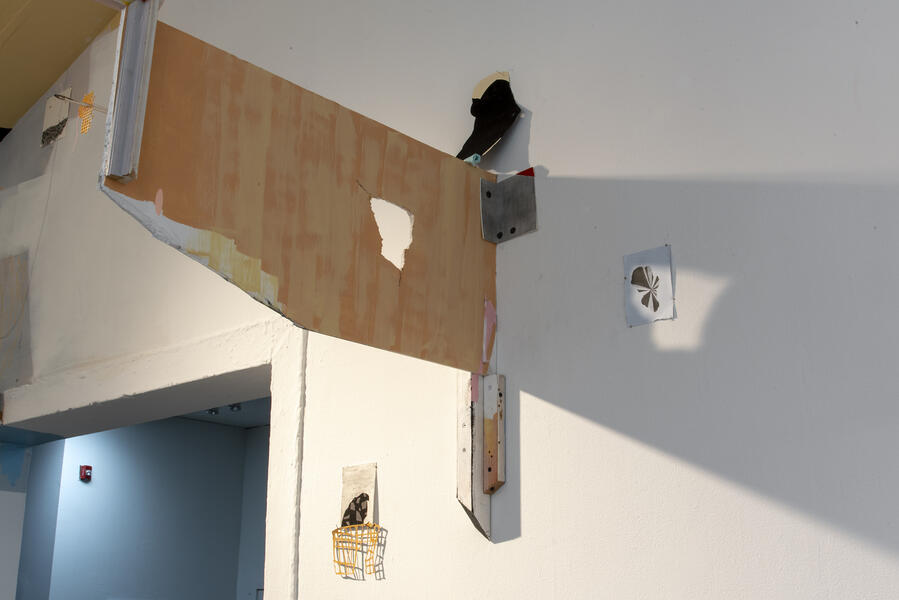 soft obstacle
soft obstacle -
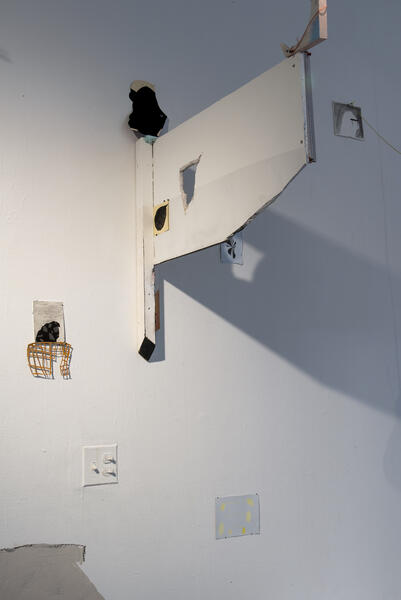 soft obstacle
soft obstacle -
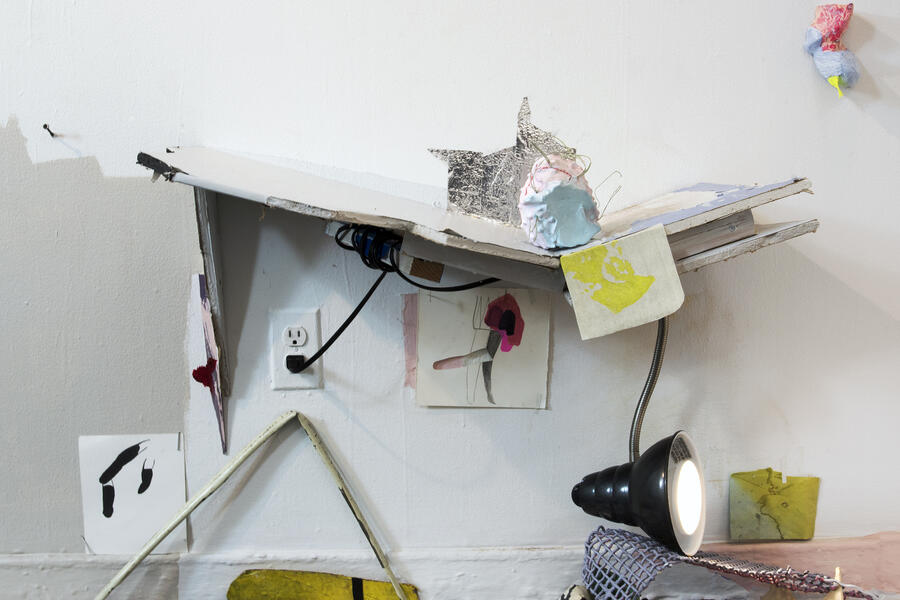 soft obstacle
soft obstacle -
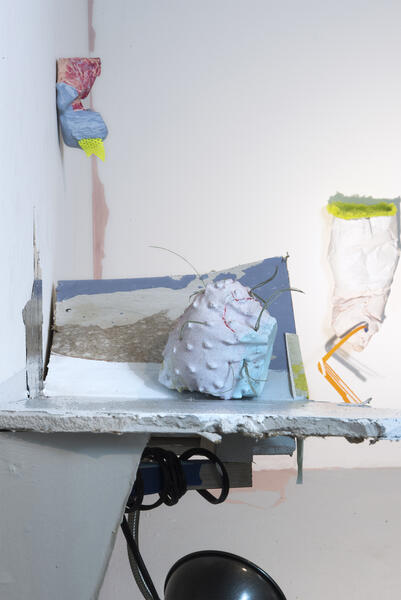 soft obstacle
soft obstacle -
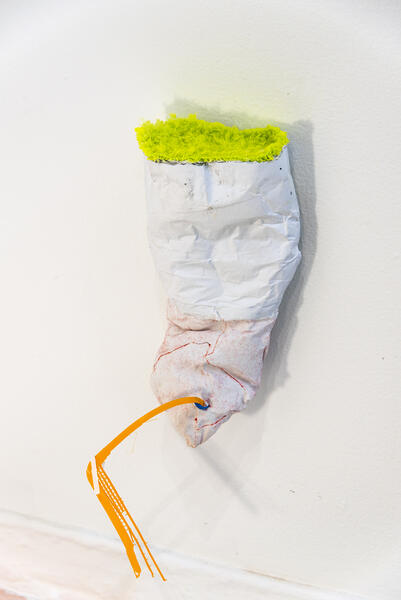 soft obstacle
soft obstacle -
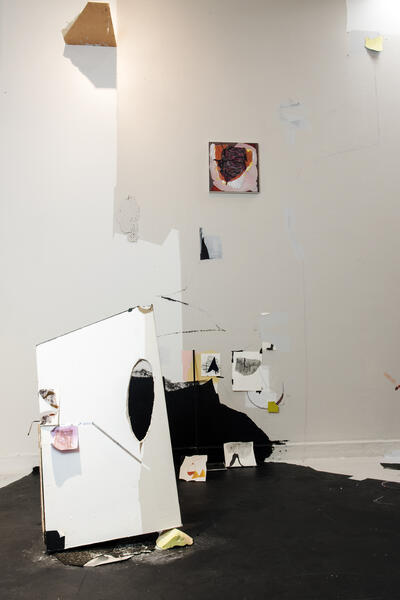 soft obstacle
soft obstacle -
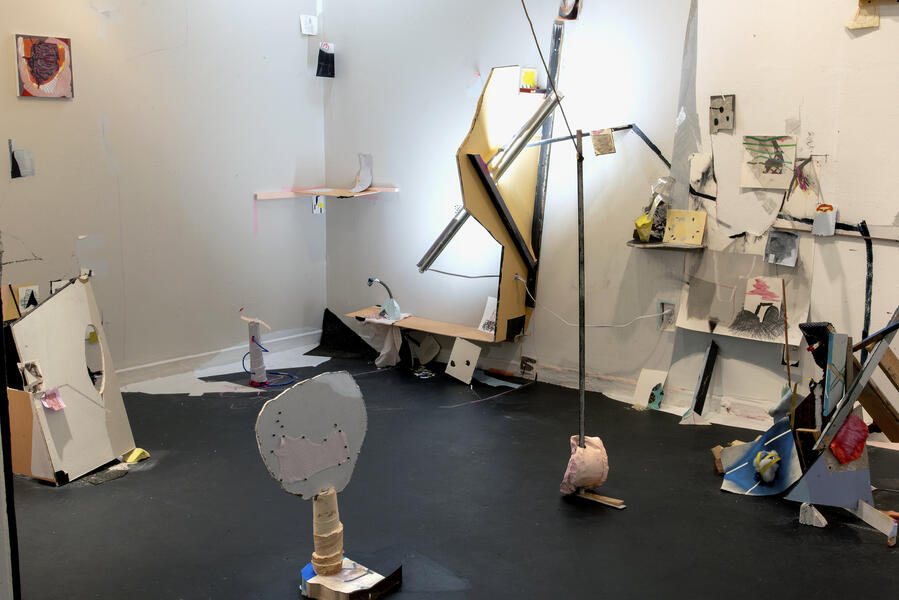 soft obstacle
soft obstacle -
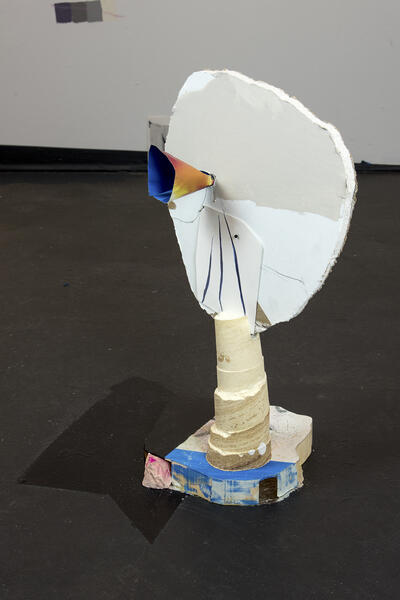 soft obstacle
soft obstacle
soft obstacle (2/2)
soft obstacle
2019
Solo exhibition created for the School 33 Project Space Gallery in 2019. Over a decade of moving between painting and installation work, I had consistently generated a a voluminous amount of small, fragmentary works on paper; soft obstacle grew out of my wish to develop an exhibition that would center, and spin out of, this body of work. While I retained much of my familiar improvisational, site-responsive sculptural approach, the little drawings played an outsized role, like a population of trickster microbes determining the form and trajectory of the gallery's ecosystem.
It was also the realization of another long-simmering desire, which was to create an installation that would change continuously over the course of the exhibition. Rather than presenting an arbitrarily "definitive" endpoint that would remain static for the two-month run of the show, I insisted on maintaining an active space of perceptual fermentation, conflict, and evolution. The most intense period of making happened in the eight days leading up to the exhibition's opening. Afterwards, I revisited the space every week, quietly taking in everything that was happening, and making adjustments that seemed organic to the dynamics of the room.
.
.
.
A few notes about how soft obstacle was made:
Materials
Per my usual methods, I set up to work in the gallery with no 'finished' objects and no definitive concept of how the installation would take shape. But I knew I wanted to key in on two strands of my studio practice: small works on paper (as mentioned above) most roughly four or five inches square, and cast objects. The latter was a very new experiment for me, where I was using discarded packing material and fabric as single-use molds for creating forms in pigmented plaster, with various foreign objects inserted into the plaster as it cured .
I also used salvaged lumber and drywall, either recycled from my previous installations or, in some cases, left behind by artists who had used the Project Space gallery before me.
Lighting
The gallery had no pre-installed track lighting, and I chose to use only the bulbs and fixtures available in gallery storage. This meant a menagerie of clamp lights, desk lamps, and LED tubes, all producing illumination of different temperature and intensity.
These lights were intentionally staged as conspicuous sculptural elements in direct correspondence with the things I brought from my studio; cords, plugs, clamps would be visible, and I would have to build structures as needed to control the placement and direction of illumination.
Process
I placed the lights before arranging any other materials. Then I began to populate the space with the drawings and plaster forms in response to the available light, augmenting the gallery architecture with platforms, half-walls, and other hastily-built protuberances. I looked for affinities and tensions between objects, playing with density versus sparseness, observing how different zones of the installation began to take on different characteristics, which suggested paths for refinement and subversion.
Painting 2016-2019
Selection from a body of work that began in 2014, when I resumed painting after several years of working almost exclusively in sculptural installation.
-
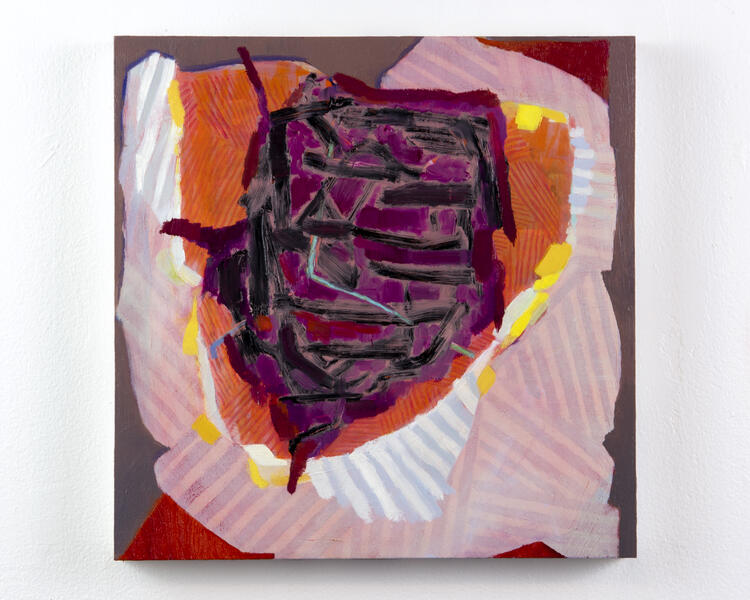 More Animal
More AnimalOil on wood panel, 10 in. x 10 in.
-
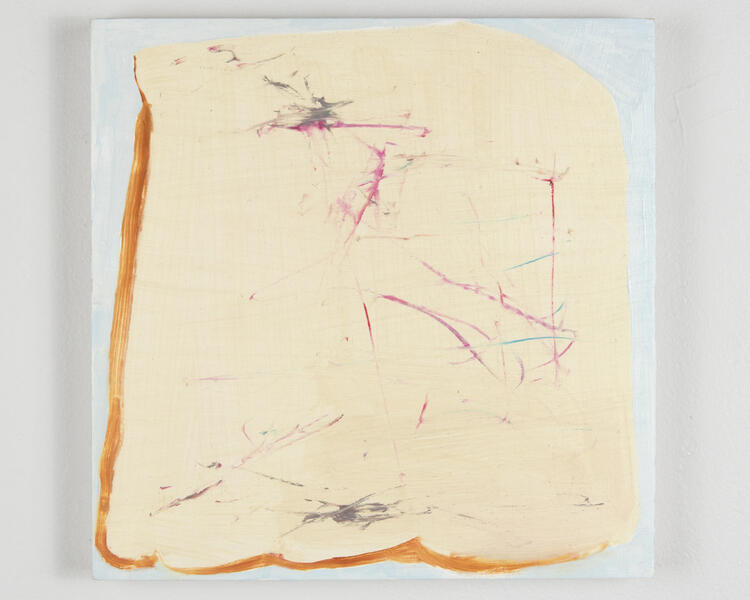 your ancient see through waysoil on panel, 10 in. x 10 in.
your ancient see through waysoil on panel, 10 in. x 10 in. -
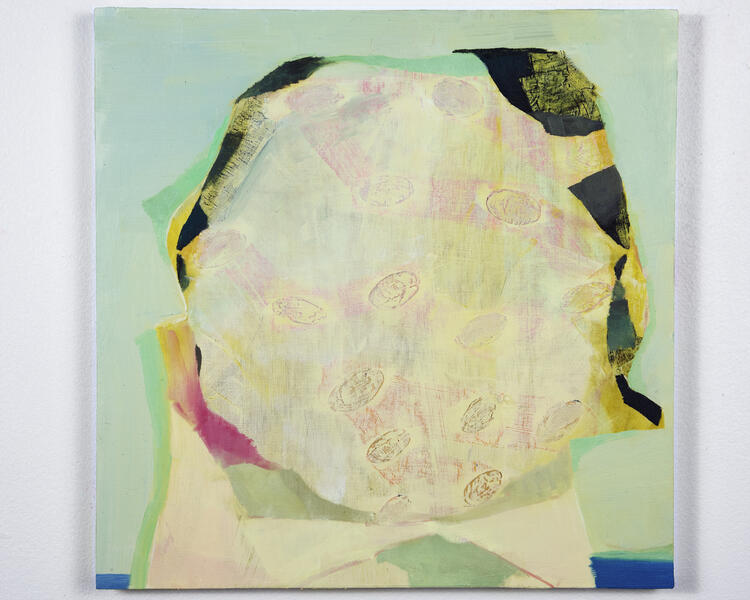 I'm here for the interview
I'm here for the interviewoil on panel, 12 in. x 12 in.
-
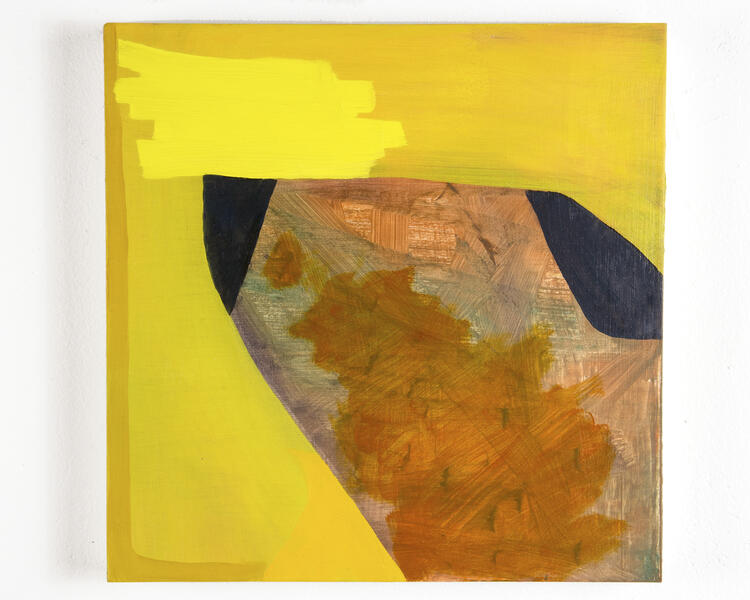 Something has inflated meoil on panel, 10 in. x 10 in.
Something has inflated meoil on panel, 10 in. x 10 in. -
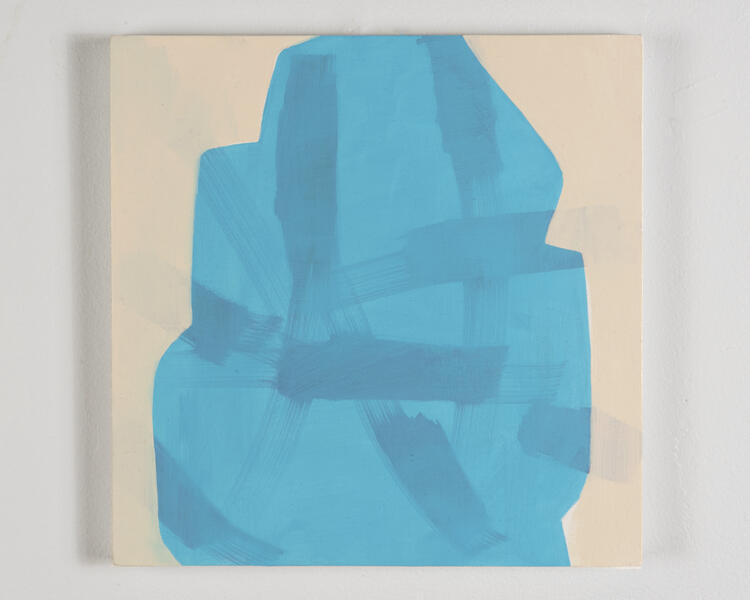 Mouthfeeloil on panel, 10 in. x 10 in.
Mouthfeeloil on panel, 10 in. x 10 in. -
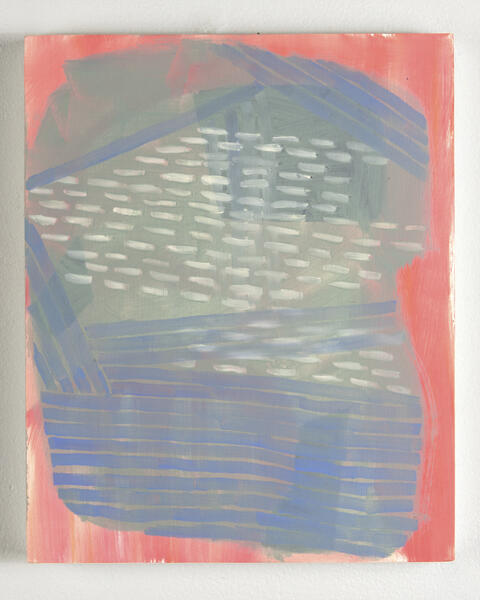 Our New SingerOil on panel, 10 in. x 8 in.
Our New SingerOil on panel, 10 in. x 8 in. -
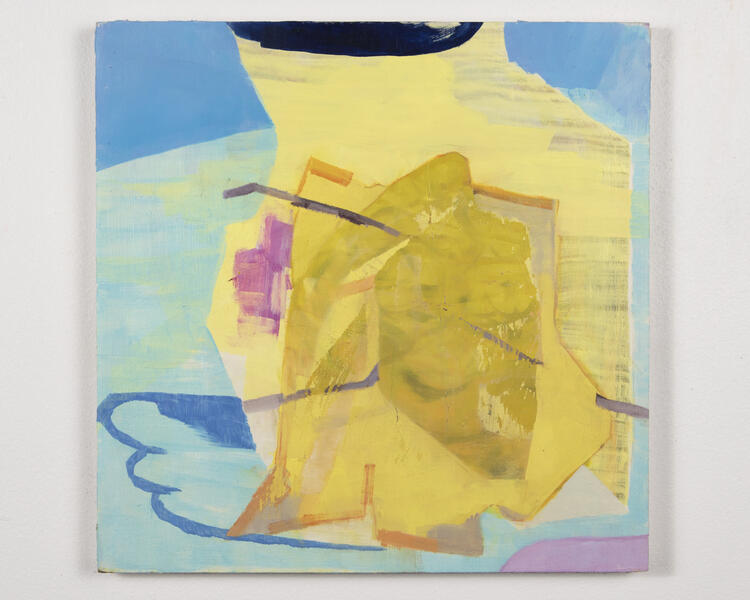 MonopodOil on panel. 12 in. x 12 in.
MonopodOil on panel. 12 in. x 12 in. -
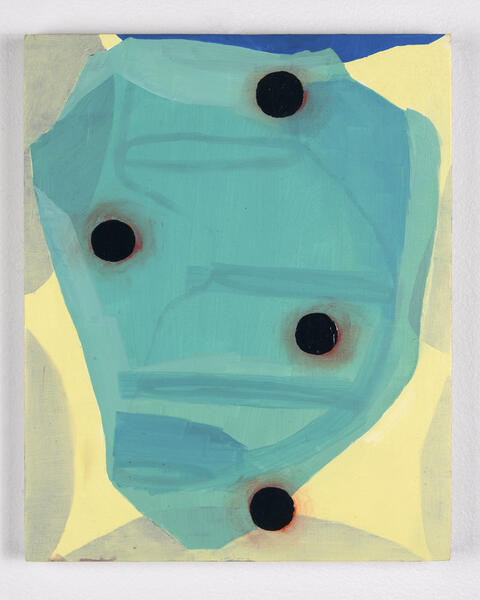 Blinks
BlinksOil on panel, 10 in. x 8 in.
-
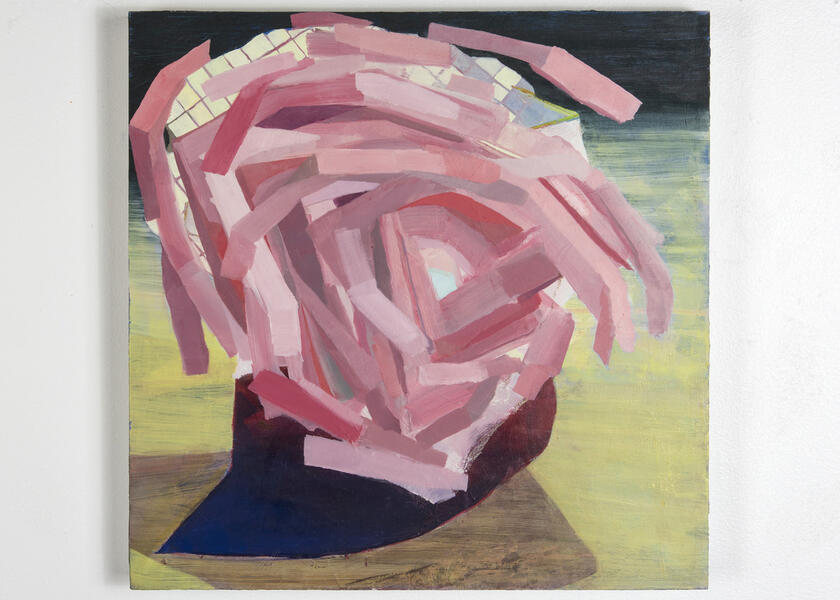 singing what it practiced its whole life
singing what it practiced its whole lifeOil on panel, 16 in. x 16 in., 2015
-
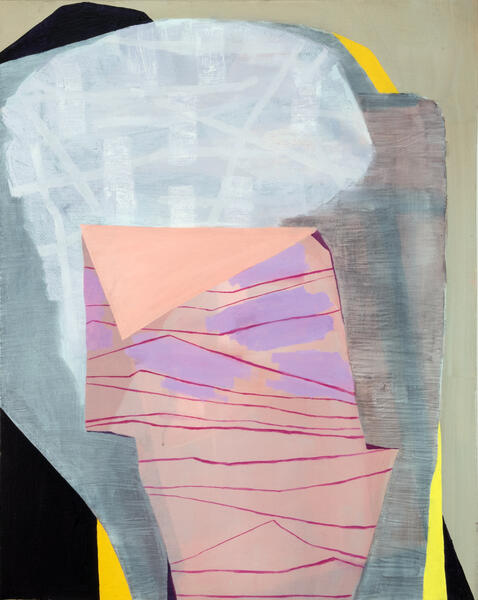 First Proof
First ProofOil on canvas, 20 in. x 16 in.
Sculpture/Installation, 2017 (1)
This project highlights work I made at the Vermont Studio Center residency in November 2017. Within the space of this studio, I completed two site-responsive pieces (no trap/no treasure and Agnes Gin Nap) alongside a series of paintings and works on paper.
-
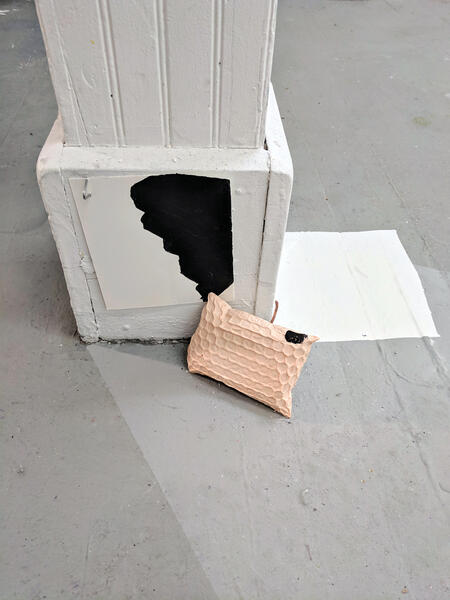 no trap/no treasureDetail view. Tinted cast hydrocal with embedded copper piece, graphite drawing, floor painting. 2017.
no trap/no treasureDetail view. Tinted cast hydrocal with embedded copper piece, graphite drawing, floor painting. 2017. -
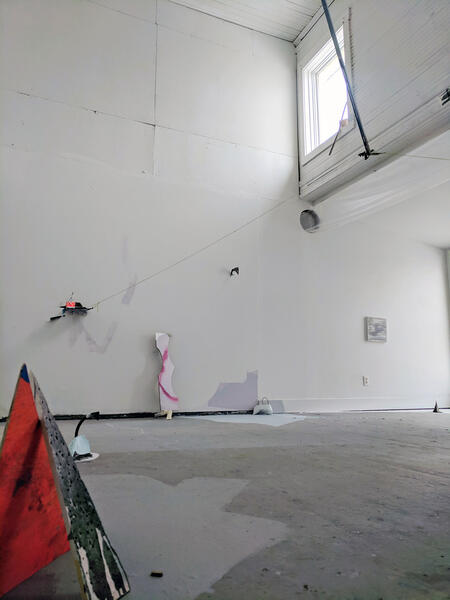 no trap/no treasureInstallation with salvaged wood and metal, cast hydrocal objects,drawings,on-site painting. Vermont Studio Center, 2017.
no trap/no treasureInstallation with salvaged wood and metal, cast hydrocal objects,drawings,on-site painting. Vermont Studio Center, 2017. -
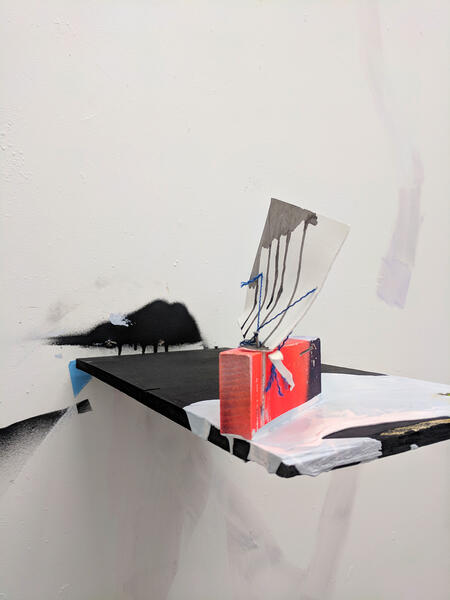 no trap/no treasureDetail view. Wood, drawing, thread, paint.
no trap/no treasureDetail view. Wood, drawing, thread, paint. -
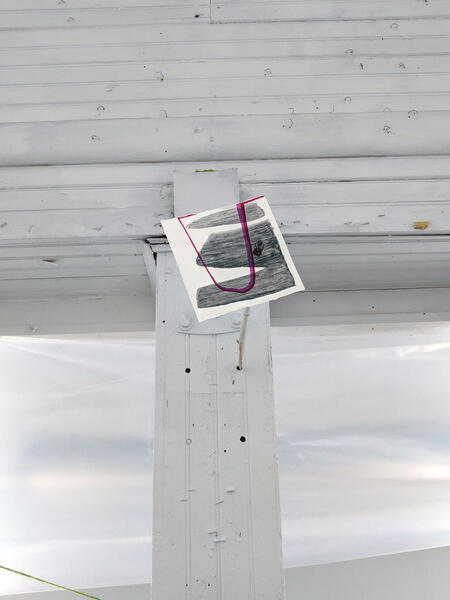 no trap/no treasureDetail view. Drawing impaled on metal-tipped wood dowel inserted into pillar. 2017.
no trap/no treasureDetail view. Drawing impaled on metal-tipped wood dowel inserted into pillar. 2017. -
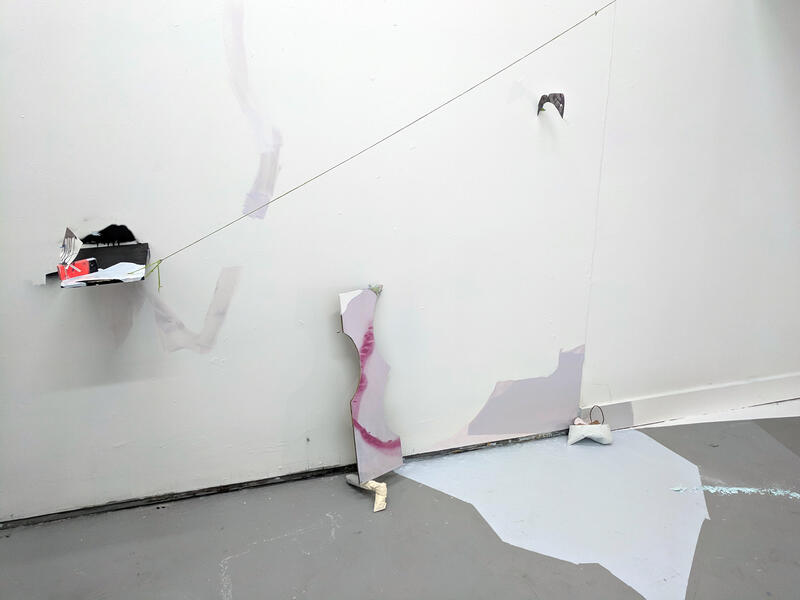 no trap/no treasurePartial view of installation, with salvaged wood and metal, cast hydrocal objects,drawings,on-site painting.
no trap/no treasurePartial view of installation, with salvaged wood and metal, cast hydrocal objects,drawings,on-site painting. -
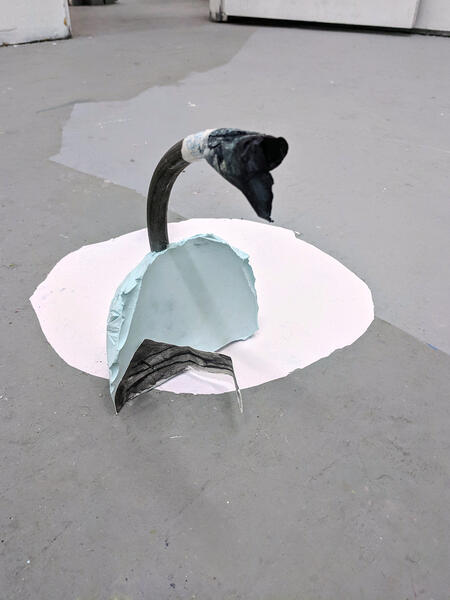 no trap/no treasureDetail view. Tinted hydrocal with embedded steel, drawing fragments, floor painting.
no trap/no treasureDetail view. Tinted hydrocal with embedded steel, drawing fragments, floor painting. -
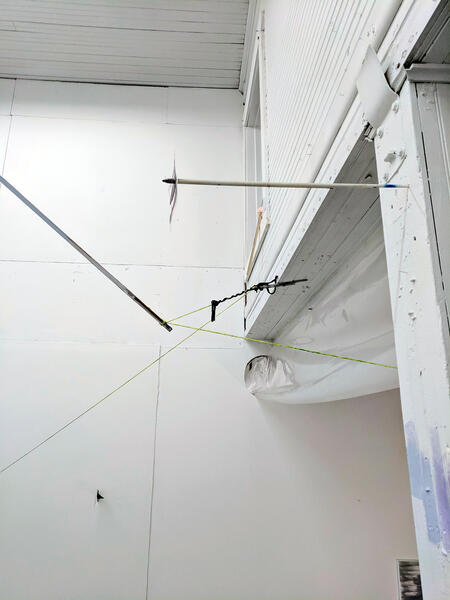 no trap/no treasureAlternate installation view. The character of this installation changed depending on the viewer's position and perception of relative scale. In this image it nearly dissolves into a delicatel spatial drawing, while from other perspectives it becomes more animated, populated by more assertive sculptural statements and applied color.
no trap/no treasureAlternate installation view. The character of this installation changed depending on the viewer's position and perception of relative scale. In this image it nearly dissolves into a delicatel spatial drawing, while from other perspectives it becomes more animated, populated by more assertive sculptural statements and applied color. -
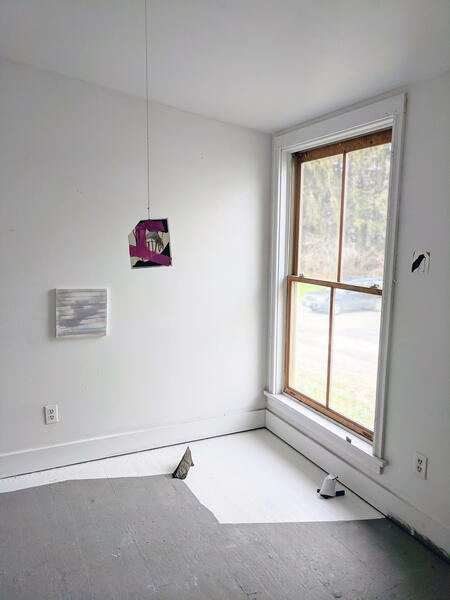 Agnes Gin NapTinted hydrocal object with nail, inked packing envelope fragment, black palm cuttings, two small drawings, painting on panel, window. 2017.
Agnes Gin NapTinted hydrocal object with nail, inked packing envelope fragment, black palm cuttings, two small drawings, painting on panel, window. 2017. -
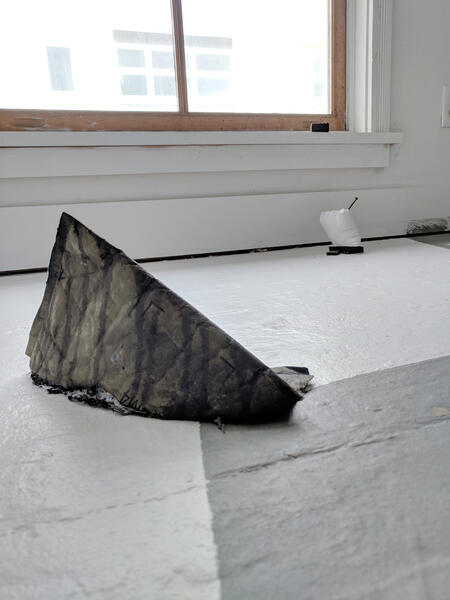 Agnes Gin Nap (detail)Detail view of Agnes Gin Nap installation. Tinted hydrocal object with nail, inked packing envelope fragment, black palm cuttings, two small drawings, painting on panel, window. 2017.
Agnes Gin Nap (detail)Detail view of Agnes Gin Nap installation. Tinted hydrocal object with nail, inked packing envelope fragment, black palm cuttings, two small drawings, painting on panel, window. 2017. -
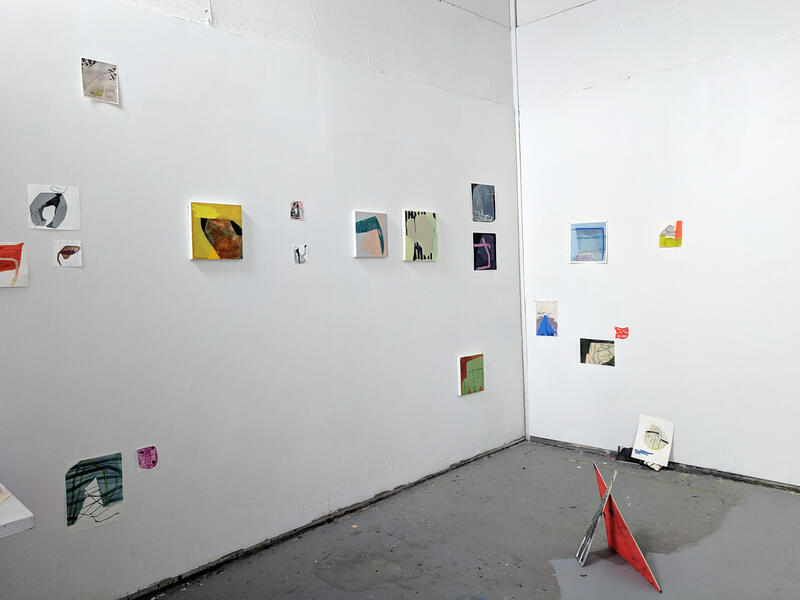 installation view of paintings completed at Vermont Studio CenterArrangement of paintings and drawings that were made and shown in the same space as "no trap/no treasure" and "Agnes Gin Nap" installations.
installation view of paintings completed at Vermont Studio CenterArrangement of paintings and drawings that were made and shown in the same space as "no trap/no treasure" and "Agnes Gin Nap" installations.
Sculpture/ Installation, 2017 (2)
Room made of taken away (nesting studies) is an installation that was made for Birdland and the Anthropocene, a group exhibition organized around the theme of extinction at the Peale Center in Baltimore, curated by Lynne Parks.
This installation expands on my previous "Nesting Studies" (represented below). For this ongoing body of work, I frame my intuitive and playful process in the context of the survival strategies of migrating bird populations as they contend with, and adapt to, climate change and inhospitable urban environments.
(Title borrowed from "God of Rooms" by Jean Valentine)
The second work represented here is that giant urge to hover, an installation completed for the 2017 Trawick Prize exhibition.
-
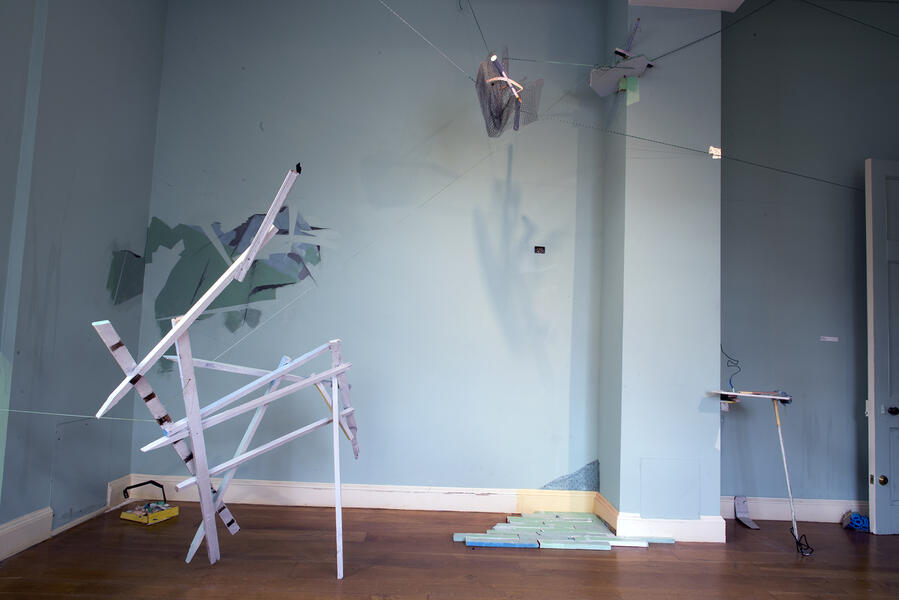 room made of taken-away (nesting studies)
room made of taken-away (nesting studies) -
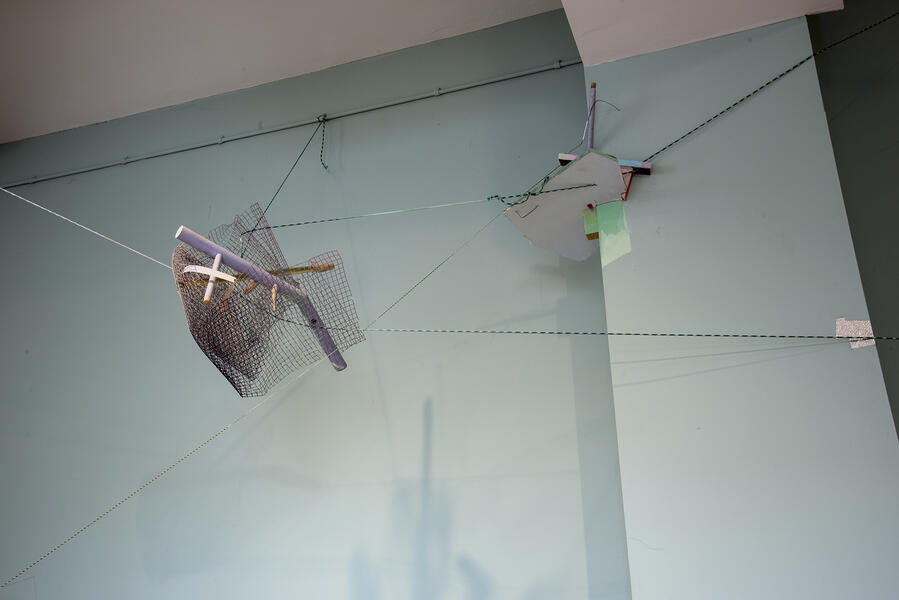 room made of taken-away (nesting studies)
room made of taken-away (nesting studies) -
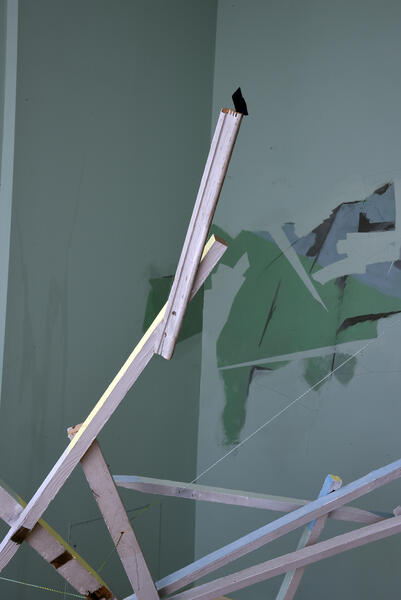 room made of taken-away (nesting studies)
room made of taken-away (nesting studies) -
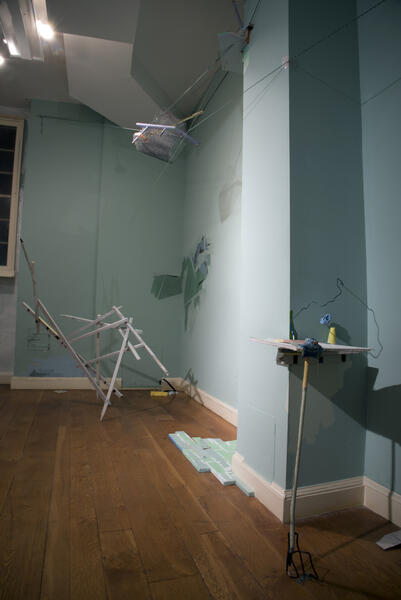 room made of taken-away (nesting studies)
room made of taken-away (nesting studies) -
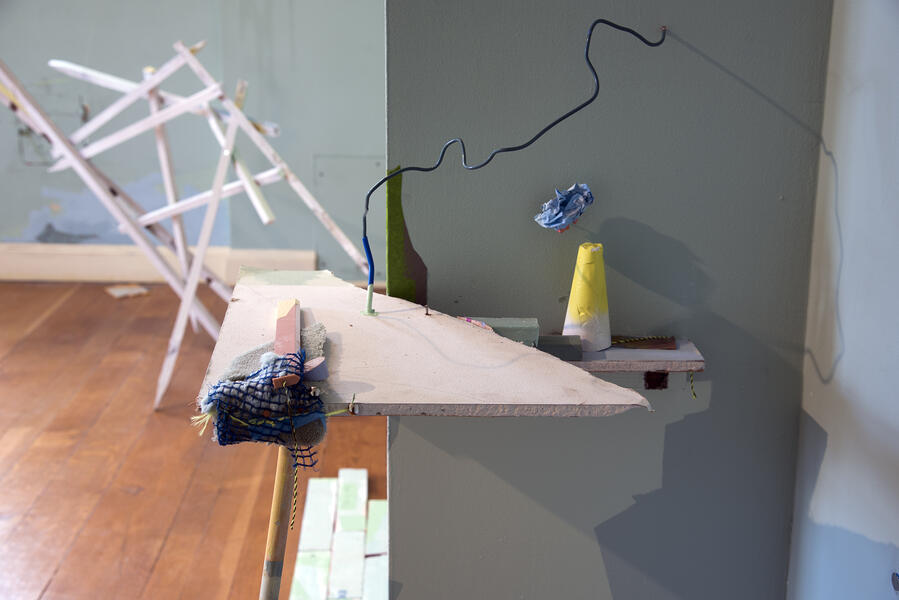 room made of taken-away (nesting studies)
room made of taken-away (nesting studies) -
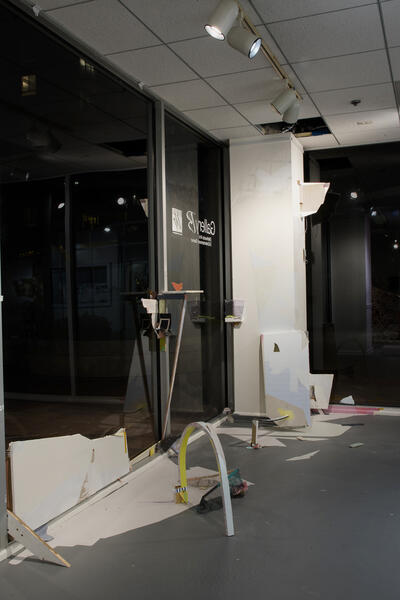 that giant urge to hover
that giant urge to hover -
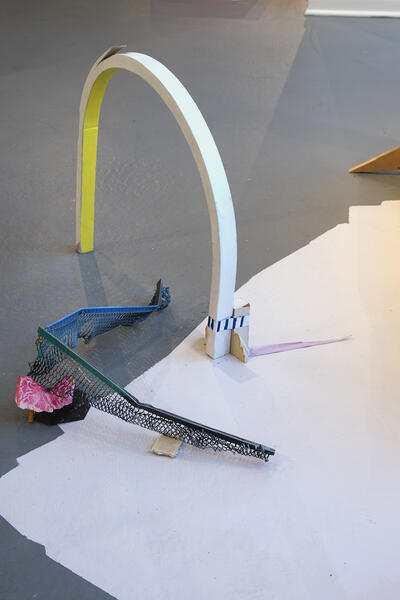 that giant urge to hover
that giant urge to hover -
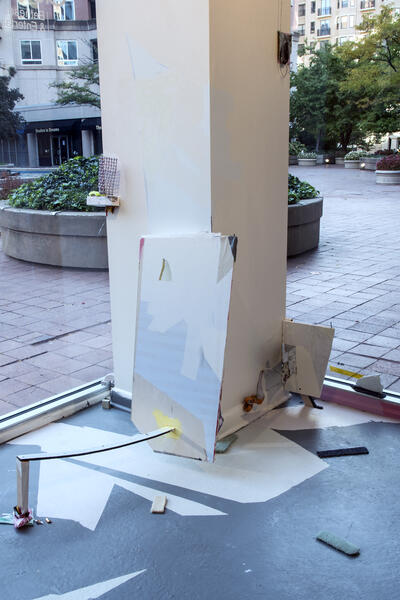 that giant urge to hover
that giant urge to hover -
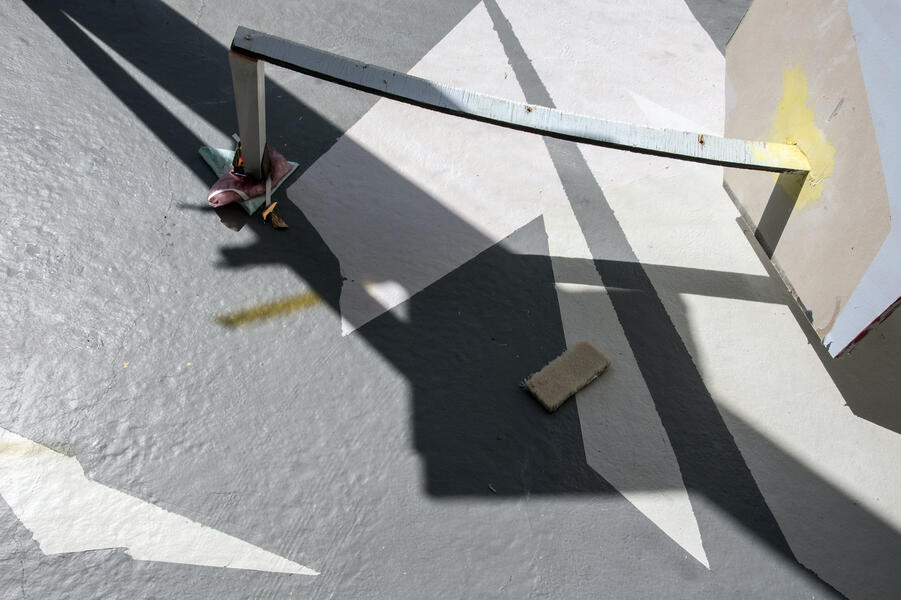 that giant urge to hover
that giant urge to hover -
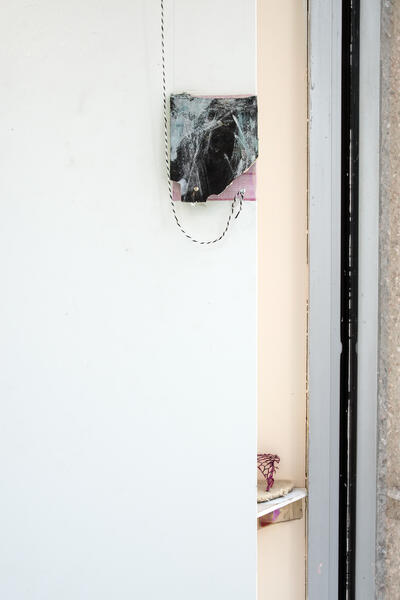 that giant urge to hover
that giant urge to hover
Paper Works
I'm continually generating small works on paper as I move between painting and installation projects. My 2019 solo exhibition, soft obstacle, was originally conceived as a way to stage these works in a way that reflected my experience of them in the studio: less as autonomous visual statements, more as fugitive things that flicker between image and materiality, whose meaning and function shift through accretion and interrelation.
-
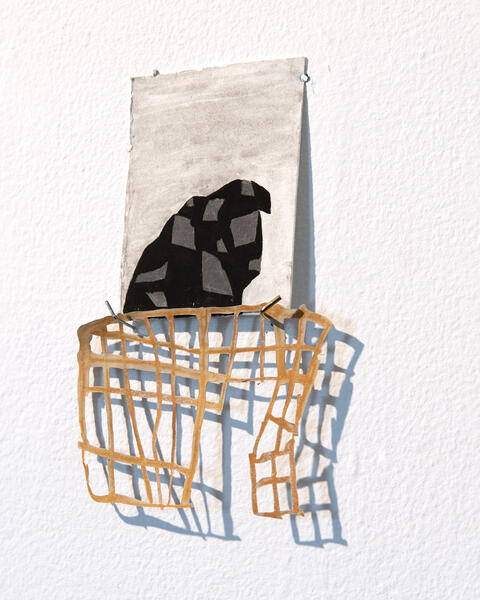 untitled (soft obstacle series)
untitled (soft obstacle series)Graphite and flashe on paper, cut paper with crayon, nails.
9 in. x 5 in. x .75 in.
-
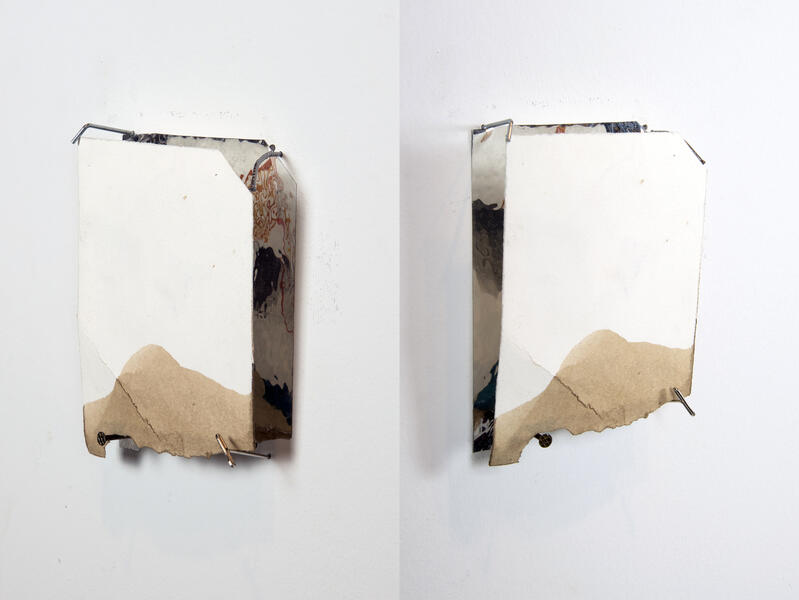 shelter in place
shelter in placeReversed drawing with ink stain, metallic contact paper, mismatched nails. 4.5 in. x 3.5 in. x .75 in. (composite view)
-
 untitled (soft obstacle series)
untitled (soft obstacle series)Gouache and graphite wash on paper, 2018. 5.5 in x 4.25 in.
-
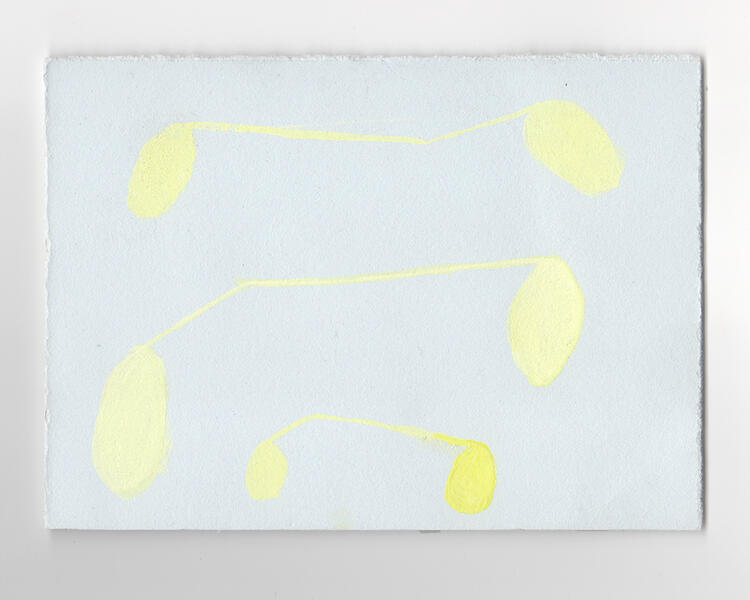 untitled (soft obstacle series)
untitled (soft obstacle series)Gouache on colored paper, 2018. 4 in. x 5.5 in.
-
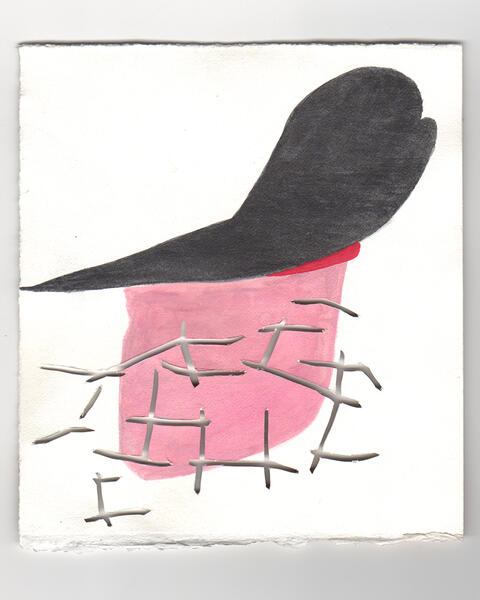 untitled (soft obstacle series)
untitled (soft obstacle series)Graphite and gouache on cut paper, 2017. 6 in. x 5.5 in.
-
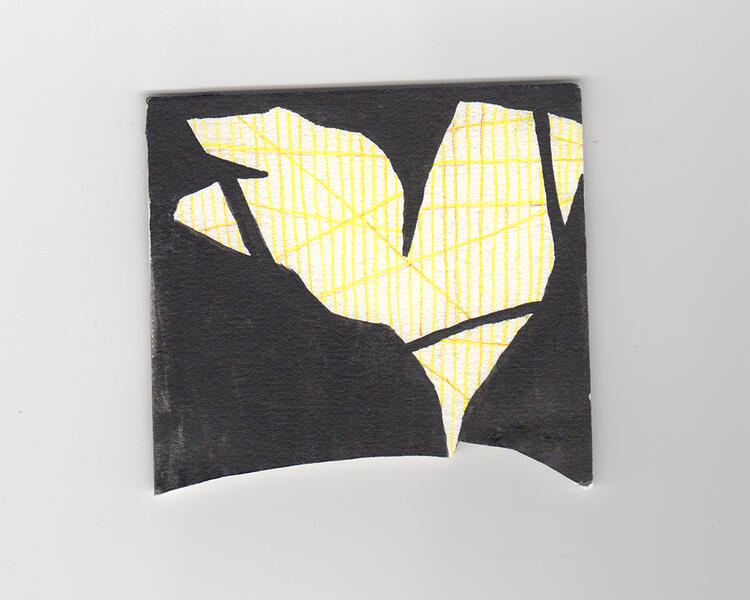 untitled (soft obstacle series)
untitled (soft obstacle series)graphite, gouache, and colored pencil on shaped paper, 4 in. x 5 in.
-
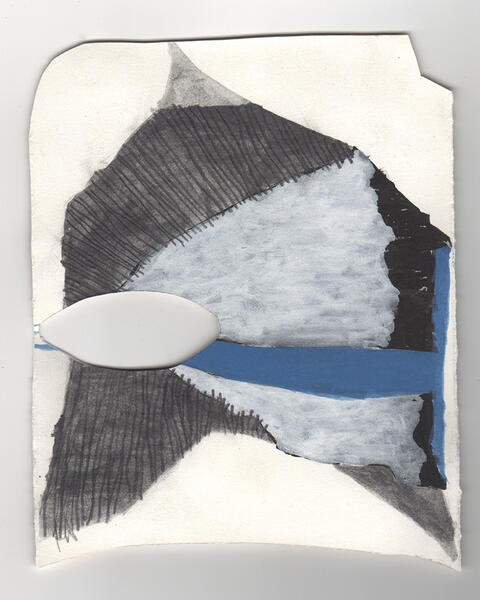 untitled (soft obstacle series)
untitled (soft obstacle series)Graphite and paint on cut/shaped paper, 2018. 6.75 in. x 5.75 in.
-
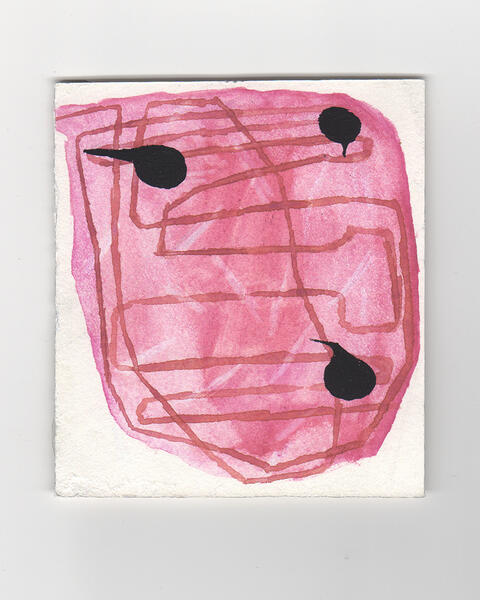 untitled (soft obstacle series)
untitled (soft obstacle series)Gouache on paper, 2018. 4 in. x 3 in.
-
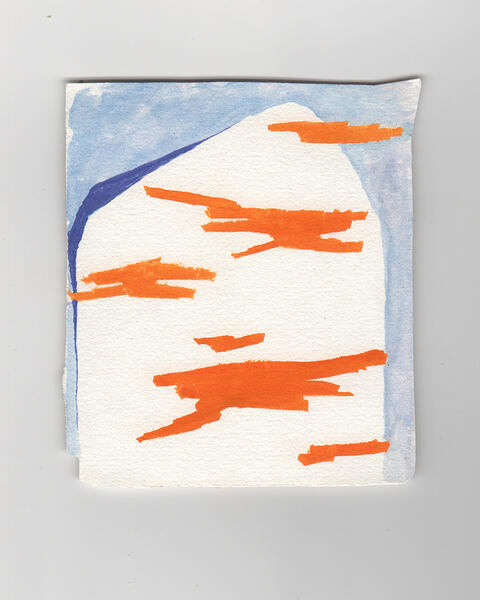 untitled (soft obstacle series)
untitled (soft obstacle series)Gouache on shaped paper, 2018. 4 in. x 3 in.
Against Weather (2016)
Total dimensions of installation: 10 ft. (h) x 13 ft. (w) x 16 ft. (h)
-
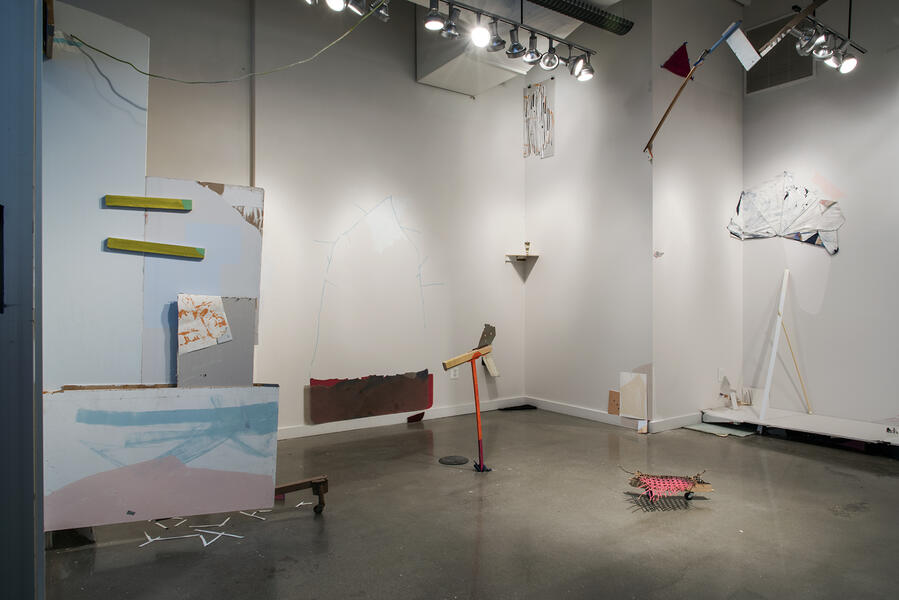 Against WeatherPartial view of Against Weather, a solo project that encompassed the entire space of the Common Ground Gallery in VisArts at Rockville. The entire installation was improvised on site over a three-week period using salvaged materials.
Against WeatherPartial view of Against Weather, a solo project that encompassed the entire space of the Common Ground Gallery in VisArts at Rockville. The entire installation was improvised on site over a three-week period using salvaged materials. -
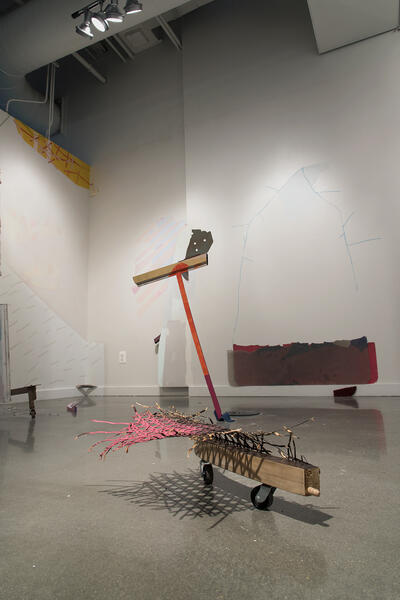 Against Weather
Against Weather -
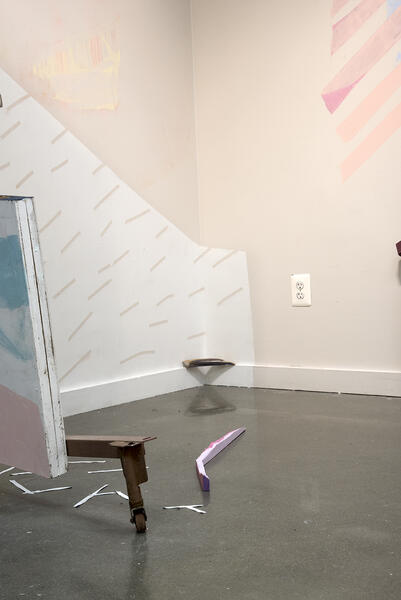 Against Weather
Against Weather -
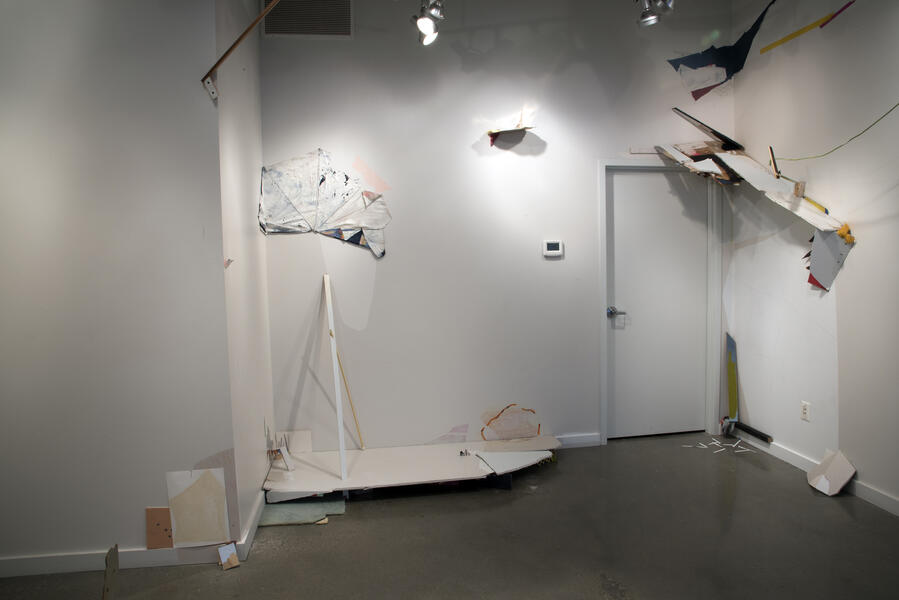 Against Weather
Against Weather -
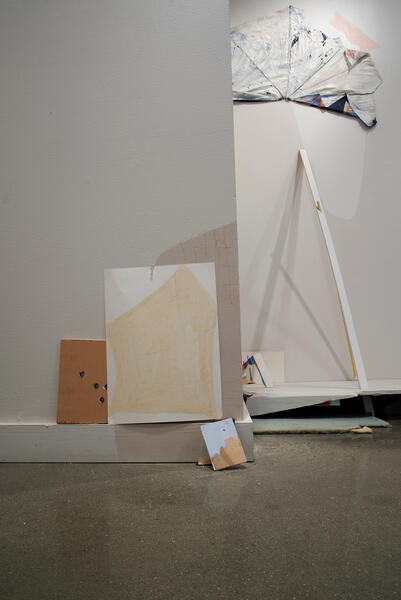 Against Weather
Against Weather -
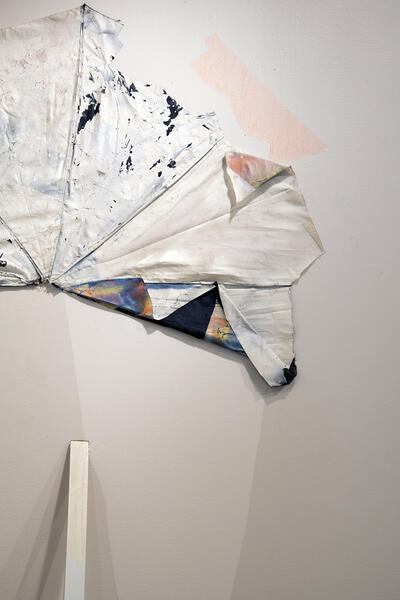 Against Weather
Against Weather -
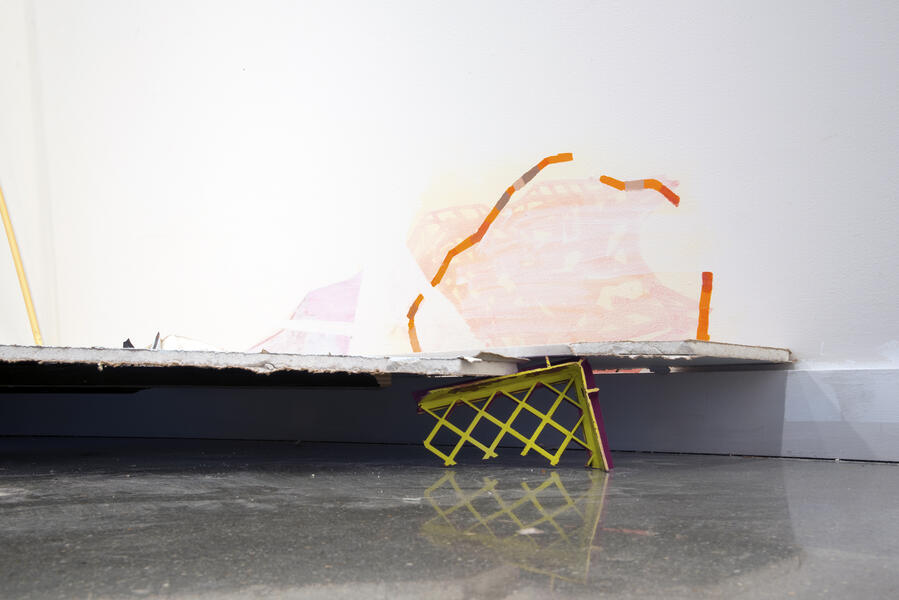 Against Weather
Against Weather -
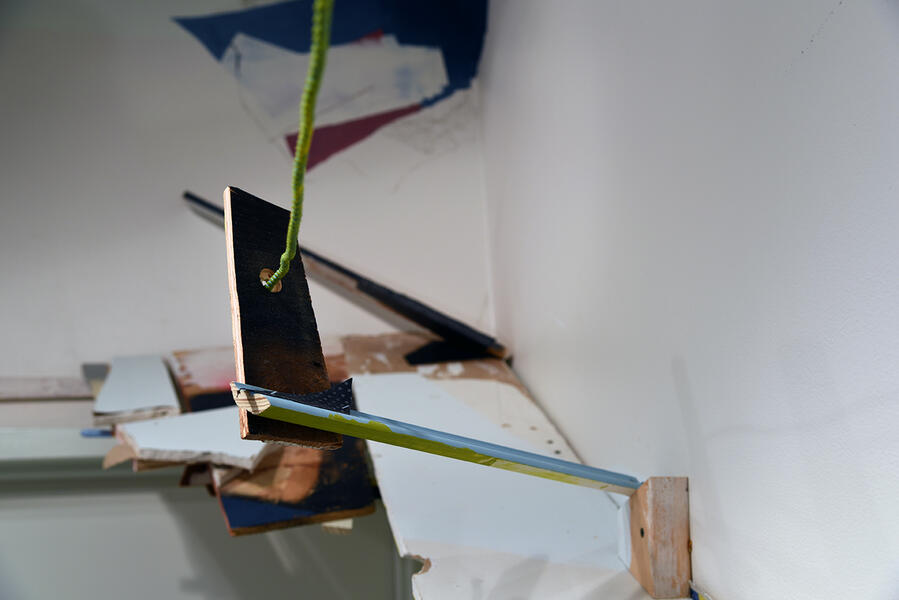 Against Weather
Against Weather -
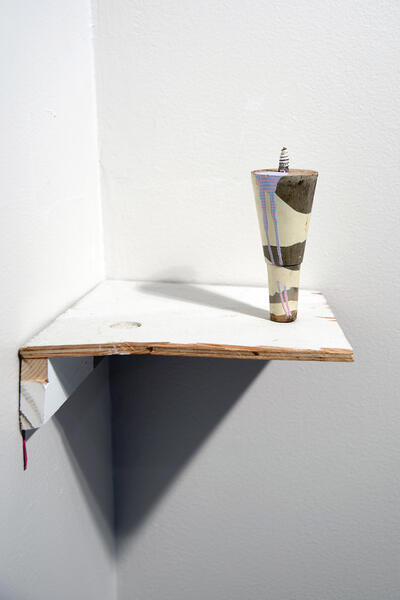 Dear LightningSofa leg, paint, custom shelf. 2016. Standalone piece embedded in the Against Weather installation.
Dear LightningSofa leg, paint, custom shelf. 2016. Standalone piece embedded in the Against Weather installation. -
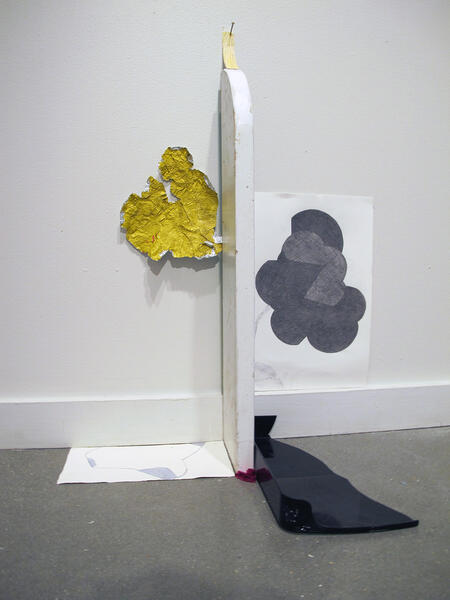 what silence won't sit stillSalvaged wood, drawing fragments, broken plastic tray, colored foil. 2016. Standalone piece embedded in Against Weather installation.
what silence won't sit stillSalvaged wood, drawing fragments, broken plastic tray, colored foil. 2016. Standalone piece embedded in Against Weather installation.
Sculpture/Installation 2013-2015
Selected works completed between 2013 and 2015.
My artistic practice is a hybrid of drawing, object manipulation, and site-responsive construction. Through these overlapping activities I engage with a variety of salvaged materials. I choose to work with things that are marked or shaped by prior use—contractors’ trash, unfinished drawings, detritus found on walks, leavings of other people’s projects. These materials are minimally modified in the studio before they are brought to the exhibition space, where relationships between fragmentary components are developed on-site through intuitive arrangement and re-orientation.
The objects in my installations function like displaced characters or invasive organisms learning to survive in new territory; in negotiating both their individual presences and a cumulative identity, they labor to establish a kind of microclimate within the gallery. This is both a meditation on fragility and a material meditation on the human capacity to make use and make do: the will to adapt to uncertain conditions and the resourcefulness to persist with what is on hand.
-
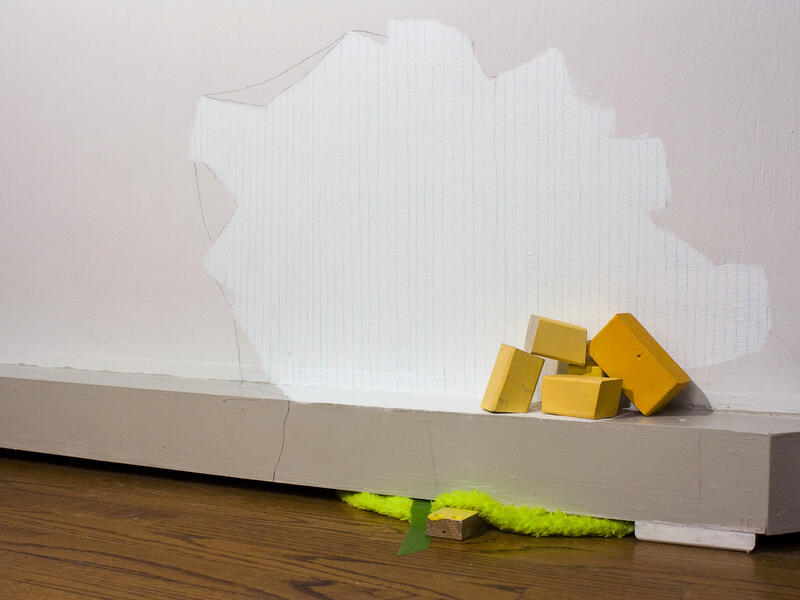 CountertenorSite-specific wall painting with line drawing, painted wood blocks, fabric, tape. 16 in. x 16 in. x 4 in.
CountertenorSite-specific wall painting with line drawing, painted wood blocks, fabric, tape. 16 in. x 16 in. x 4 in. -
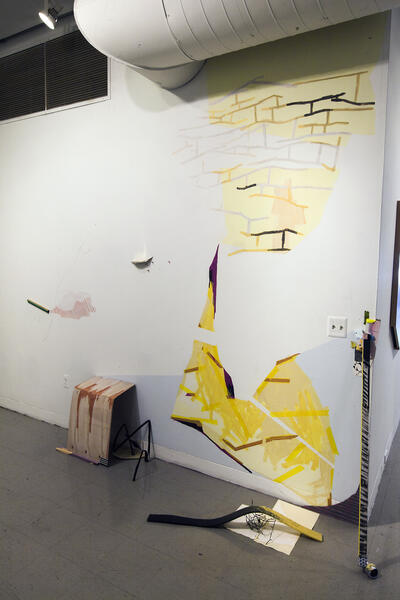 Skitter IndexObjects, paint, drawing. 2015.
Skitter IndexObjects, paint, drawing. 2015. -
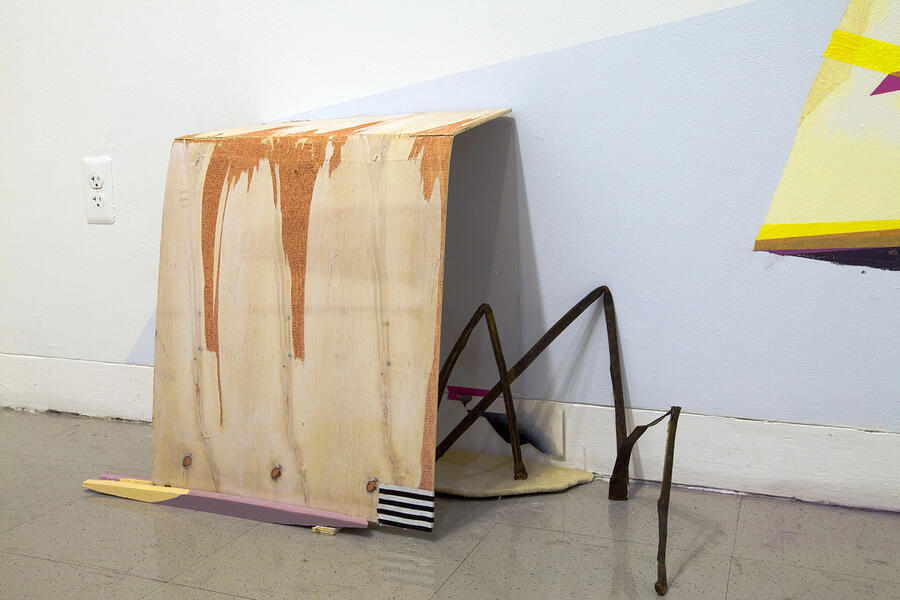 Skitter IndexDetail view
Skitter IndexDetail view -
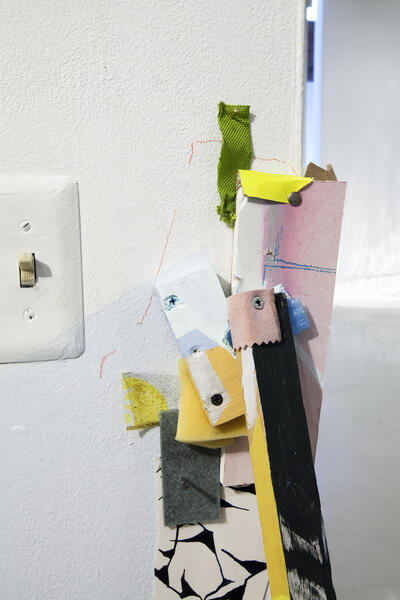 Skitter Index (detail)Objects, paint, drawing. Detail view.
Skitter Index (detail)Objects, paint, drawing. Detail view. -
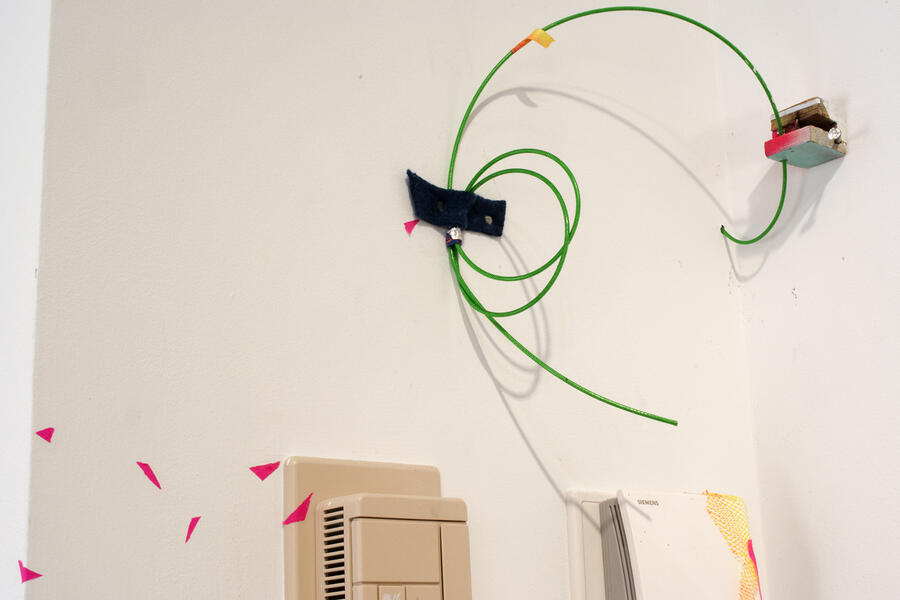 Nesting Studies #3 (corner, alarm)Wood, cable, tape, fabric, nails, paint. 2015.
Nesting Studies #3 (corner, alarm)Wood, cable, tape, fabric, nails, paint. 2015. -
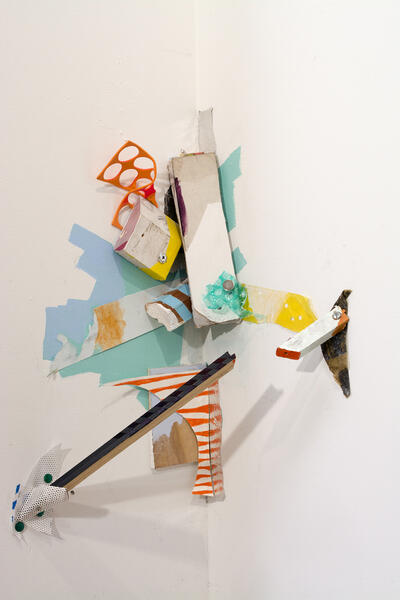 Nesting Studies #2Drawing fragments, wood, wall painting, various other materials. 2015.
Nesting Studies #2Drawing fragments, wood, wall painting, various other materials. 2015. -
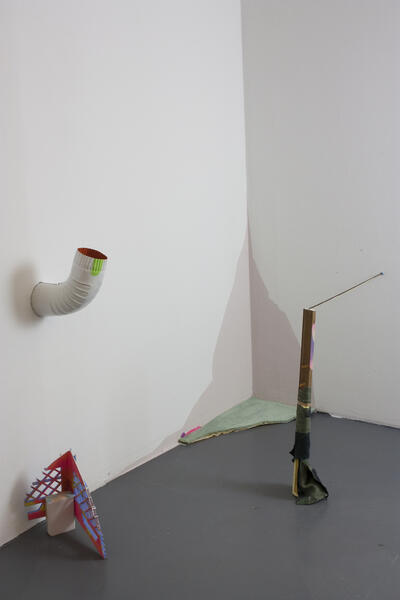 Custom ClimateObjects, paint, drawing 2014
Custom ClimateObjects, paint, drawing 2014 -
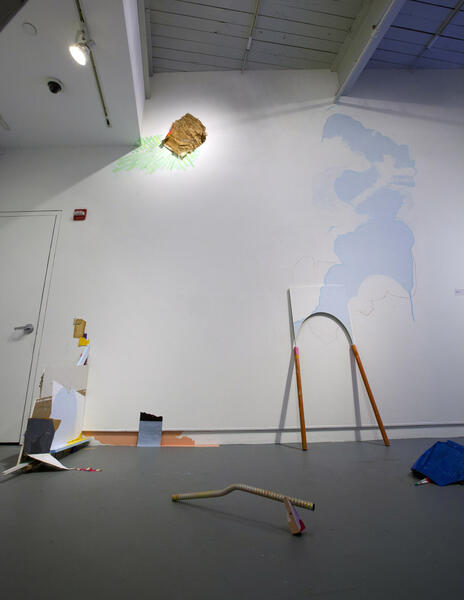 Indoor Verbs
Indoor Verbsobjects, paint, drawing
Installation completed for the 2013 Sondheim Prize Semi-finalists exhibition
-
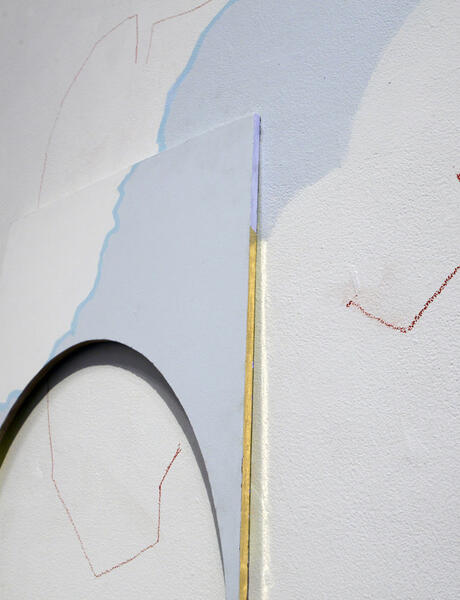 Indoor Verbs
Indoor Verbsobjects, paint, drawing
Installation completed for the 2013 Sondheim Prize Semi-finalists exhibition
-
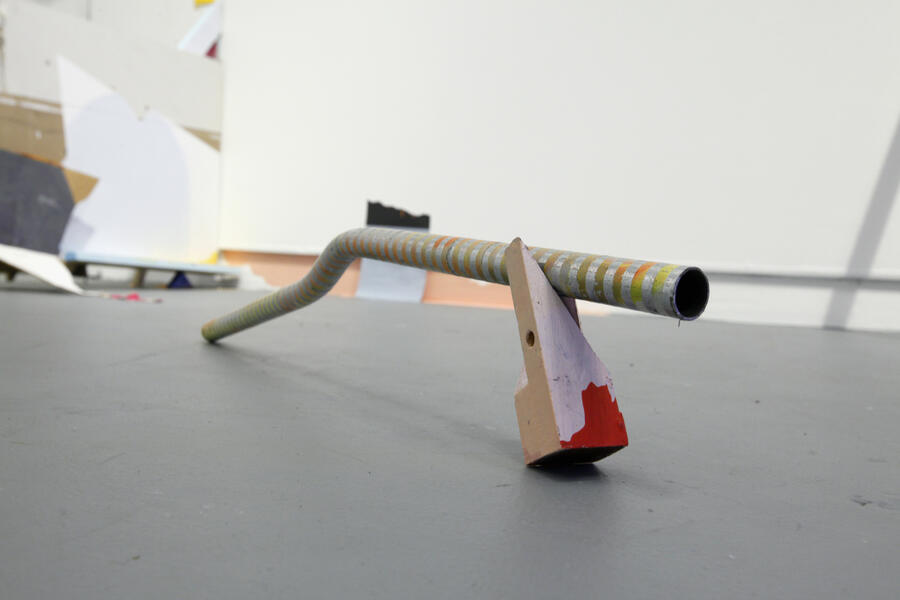 Indoor Verbs
Indoor Verbsobjects, paint, drawing
Detail view of installation completed for the 2013 Sondheim Prize Semi-finalists exhibition
